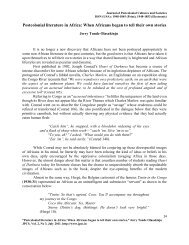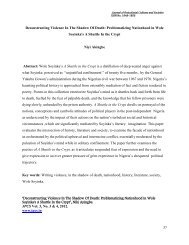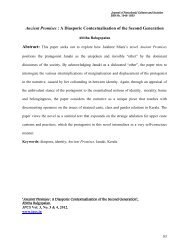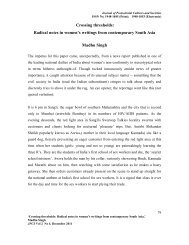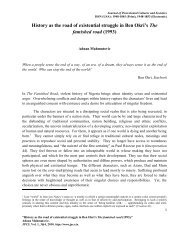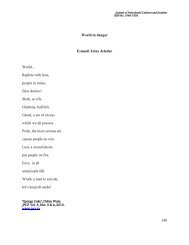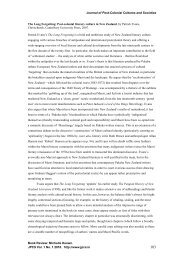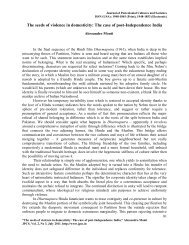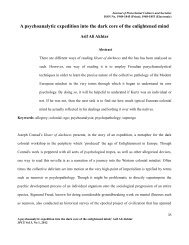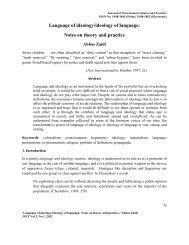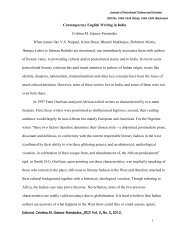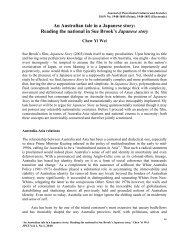Darwinist premise in the Orientalist construction of the âOtherâ - JPCS
Darwinist premise in the Orientalist construction of the âOtherâ - JPCS
Darwinist premise in the Orientalist construction of the âOtherâ - JPCS
You also want an ePaper? Increase the reach of your titles
YUMPU automatically turns print PDFs into web optimized ePapers that Google loves.
Journal <strong>of</strong> Postcolonial Cultures and Societies<br />
ISSN No. 1948-1845 (Pr<strong>in</strong>t); 1948-1853 (Electronic)<br />
<strong>Darw<strong>in</strong>ist</strong> <strong>premise</strong> <strong>in</strong> <strong>the</strong> <strong>Orientalist</strong> <strong>construction</strong> <strong>of</strong> <strong>the</strong> “O<strong>the</strong>r”<br />
Mohamed Hamoud Kassim Al-Mahfedi and Venkatesh P<br />
Abstract<br />
Based on Edward Said’s Colonial Discourse Theory and his concept <strong>of</strong> Ore<strong>in</strong>talism,<br />
this paper develops a Saidian read<strong>in</strong>g <strong>of</strong> <strong>the</strong> Orientaists’ thought <strong>in</strong> <strong>the</strong>ir relationship<br />
with non-Western people. The paper attempts to decipher <strong>the</strong> common <strong>in</strong>terface<br />
between Darw<strong>in</strong>ism and Orientalism. Located with<strong>in</strong> <strong>the</strong> postcolonial framework, <strong>the</strong><br />
paper methodologically tries to uncover <strong>the</strong> pervasively Western <strong>in</strong>tellectual and<br />
scientific m<strong>in</strong>dset which is governed by <strong>the</strong> <strong>Orientalist</strong> thought that directs its relation<br />
with <strong>the</strong> “O<strong>the</strong>r”. The Eurocentric determ<strong>in</strong>ism has been shaped and articulated<br />
through <strong>the</strong>ories such as Social Darw<strong>in</strong>ism, Functional Anthropology, Modernism,<br />
Capitalism, etc., which has co<strong>in</strong>cided and materialized <strong>in</strong> <strong>the</strong> act <strong>of</strong> colonialism,<br />
imperialism and globalization. It is to be noted that colonialism, imperialism,<br />
Orientalism are Western-based ideologies that caused <strong>the</strong> epistemological and<br />
geopolitical drift <strong>in</strong> <strong>the</strong> world order, and <strong>the</strong>ir aftermaths are still <strong>the</strong> most discussed<br />
problematics. The present social and politico-cultural world is re-formulated aga<strong>in</strong>st<br />
and/or set <strong>in</strong> accordance with those resurrected repercussions. Among <strong>the</strong> still<br />
debated issues are cultural supremacy and political hegemony, and both are<br />
legitimized and <strong>in</strong>cited by <strong>the</strong> “idea” <strong>of</strong> redemption, <strong>in</strong> Conrad’s words, or racial<br />
superiority as <strong>in</strong> Spencer’s <strong>the</strong>ory. This paper tries to probe <strong>in</strong>to <strong>the</strong> dormant <strong>premise</strong><br />
<strong>of</strong> <strong>the</strong> <strong>Orientalist</strong>/colonialist thought, and to lay bare <strong>the</strong> “idea beh<strong>in</strong>d it”, to use<br />
Conrad’s words, too, <strong>in</strong> order to relate <strong>the</strong> different parts <strong>in</strong>to <strong>the</strong> common whole <strong>of</strong><br />
Western, hegemonic cultural and political set-up.<br />
Keywords: Edward Said; Enlightenment; ideology; Orientailsm; O<strong>the</strong>r<strong>in</strong>g; <strong>the</strong> Orient;<br />
politics; power; scholarship; social Darw<strong>in</strong>ism<br />
This paper exam<strong>in</strong>es <strong>the</strong> long-term development <strong>of</strong> Orientalism as scientifically <strong>in</strong>tellectual,<br />
programmed knowledge <strong>of</strong> <strong>the</strong> “Orient”. My analysis will be aided by a <strong>the</strong>oretical<br />
framework based on a postcolonial and psychoanalytical syn<strong>the</strong>sis. Analyz<strong>in</strong>g recurrent<br />
representation <strong>of</strong> <strong>the</strong> Orientals <strong>in</strong> <strong>the</strong> European <strong>in</strong>tellectual circles, I attempt to demonstrate<br />
that <strong>the</strong> Western conception <strong>of</strong> <strong>the</strong> East has been built on socio-biological determ<strong>in</strong>ism and<br />
racially politico-cultural functionalism. This <strong>in</strong>tellectual fossilization <strong>of</strong> <strong>the</strong> “Orient” created<br />
by <strong>the</strong> <strong>Orientalist</strong> m<strong>in</strong>d-set was <strong>the</strong> driv<strong>in</strong>g force <strong>of</strong> <strong>the</strong> Western colonialism and imperial<br />
expansion. I argue that <strong>the</strong> fundamental fallacy <strong>of</strong> Orientalism lay, not <strong>in</strong> its presumptions<br />
about <strong>the</strong> ontological differences between East and West, but <strong>in</strong> its very conscious and<br />
deliberate persistence on creat<strong>in</strong>g a dichotomy. Therefore, Darw<strong>in</strong>ism and o<strong>the</strong>r social and<br />
anthropological <strong>the</strong>ories have been <strong>in</strong>troduced and utilized to justify <strong>the</strong> colonial rule whe<strong>the</strong>r<br />
under <strong>the</strong> pretext <strong>of</strong> civiliz<strong>in</strong>g missionaries or democratic redemption.<br />
‘<strong>Darw<strong>in</strong>ist</strong> <strong>premise</strong> <strong>in</strong> <strong>the</strong> <strong>Orientalist</strong> <strong>construction</strong> <strong>of</strong> <strong>the</strong> “O<strong>the</strong>r”,’ Mohamed Hamoud Kassim Al-<br />
Mahfedi and Venkatesh P<br />
<strong>JPCS</strong> Vol 3, No 1, 2012<br />
1
Journal <strong>of</strong> Postcolonial Cultures and Societies<br />
ISSN No. 1948-1845 (Pr<strong>in</strong>t); 1948-1853 (Electronic)<br />
In order to probe <strong>in</strong>to <strong>the</strong> latent hidden ideology <strong>of</strong> <strong>the</strong> <strong>Orientalist</strong> <strong>construction</strong> <strong>of</strong> <strong>the</strong><br />
“Orient”, or <strong>the</strong> Oriental “O<strong>the</strong>r”, this study sets forth three <strong>premise</strong>s. The first <strong>premise</strong> is<br />
that colonialism is <strong>the</strong> ultimate product and <strong>the</strong> materialized object <strong>of</strong> Orientalism. The<br />
second <strong>premise</strong> is that Orientalism as a corporate <strong>in</strong>stitutional, <strong>in</strong>tellectual and scholastic<br />
legitimacy <strong>of</strong> Western colonial and imperial enterprise is based on racism. The third <strong>premise</strong><br />
is that <strong>the</strong> Manichean logic and Darw<strong>in</strong>ian Theory provided <strong>the</strong> scientific, empirical and<br />
moral justification for <strong>the</strong> Western colonial and imperial expansionist desire.<br />
Social Darw<strong>in</strong>ism has played a formulat<strong>in</strong>g role <strong>in</strong> <strong>the</strong> trajectory <strong>of</strong> Western social, political<br />
as well as ideological assumptions regard<strong>in</strong>g <strong>the</strong> various “O<strong>the</strong>r”. Social Darw<strong>in</strong>ism can be<br />
def<strong>in</strong>ed ei<strong>the</strong>r strictly, with reference to <strong>the</strong>ories <strong>of</strong> social and cultural change implied by <strong>the</strong><br />
<strong>the</strong>ory <strong>of</strong> natural selection developed by Darw<strong>in</strong>, or loosely, as that dist<strong>in</strong>ct family <strong>of</strong><br />
historical <strong>the</strong>ories that claim to be <strong>the</strong>ories <strong>of</strong> social and cultural change logically entailed by<br />
Darw<strong>in</strong>ian <strong>the</strong>ory. Social Darw<strong>in</strong>ism, <strong>in</strong> its different forms defended ethnic, racial, class and<br />
gender <strong>in</strong>equality as necessary aspects <strong>of</strong> a wider conflict from which a technically and<br />
morally advanced humanity would emerge. None<strong>the</strong>less, social <strong>Darw<strong>in</strong>ist</strong>s extended<br />
Darw<strong>in</strong>'s <strong>the</strong>ories <strong>in</strong>to <strong>the</strong> realm <strong>of</strong> politics and society to rationalize conflict and conquest.<br />
The <strong>Orientalist</strong>/colonialist project, thus, has tended to use Darw<strong>in</strong>ism as a rationale for<br />
exist<strong>in</strong>g forms <strong>of</strong> exploitation and <strong>the</strong>ir extension, especially but not exclusively, <strong>in</strong> support<br />
<strong>of</strong> racism and genocide.<br />
In fact, one <strong>of</strong> <strong>the</strong> central planks <strong>in</strong> <strong>the</strong> <strong>Orientalist</strong> thought and doctr<strong>in</strong>e was <strong>the</strong> evolutionary<br />
<strong>the</strong>ory. Accord<strong>in</strong>g to this <strong>the</strong>ory, all biology had evolved upward, less evolved types should<br />
be actively eradicated and that natural selection could and should be actively aided.<br />
Therefore, <strong>the</strong> <strong>Orientalist</strong>s/colonialists <strong>in</strong>stituted political measures to control if not to<br />
eradicate all non-Western “racial threat”, whom <strong>the</strong>y considered as “underdeveloped”. The<br />
European <strong>Orientalist</strong>s/colonialists considered <strong>the</strong>mselves by this canon as <strong>the</strong> higher race<br />
which ought to subject to itself a lower race as a conceivable natural right.<br />
The em<strong>in</strong>ent scientists <strong>of</strong> Social Darw<strong>in</strong>ism shaped <strong>Orientalist</strong> conception <strong>of</strong> o<strong>the</strong>r nations<br />
and races and provided what seemed like an irrefutable validation <strong>of</strong> <strong>the</strong>ir racist beliefs<br />
crowned by <strong>the</strong> fierce imperial and colonial Western dom<strong>in</strong>ation. The support <strong>of</strong> Orientalism<br />
by Social Darw<strong>in</strong>ism and o<strong>the</strong>r scientific establishment resulted <strong>in</strong> racist, particularly anti-<br />
Semitic, anti-Islamic thought hav<strong>in</strong>g much greater <strong>in</strong>fluence than would have o<strong>the</strong>rwise been<br />
<strong>the</strong> case, as well as an enormous reassurance that one’s prejudices were actually expressions<br />
<strong>of</strong> scientific truth. The East-West or Occident-Orient demarcation was engulfed by <strong>the</strong><br />
<strong>Orientalist</strong>/colonialist ramifications such as colonial and imperial projects, superior/<strong>in</strong>ferior<br />
classification, racism and dispossession, displacement and alienation, global dualities and all<br />
o<strong>the</strong>r colonial traumas and legacies.<br />
For long <strong>the</strong> West has unquestionably ma<strong>in</strong>ta<strong>in</strong>ed to itself <strong>the</strong> power <strong>of</strong> draw<strong>in</strong>g <strong>the</strong> political<br />
map <strong>of</strong> <strong>the</strong> world and deliberately persisted on perpetuat<strong>in</strong>g <strong>the</strong> epistemological notion <strong>of</strong> <strong>the</strong><br />
Occident-Orient dichotomy <strong>in</strong> order to keep its supremacy and superiority over <strong>the</strong> Eastern<br />
‘<strong>Darw<strong>in</strong>ist</strong> <strong>premise</strong> <strong>in</strong> <strong>the</strong> <strong>Orientalist</strong> <strong>construction</strong> <strong>of</strong> <strong>the</strong> “O<strong>the</strong>r”,’ Mohamed Hamoud Kassim Al-<br />
Mahfedi and Venkatesh P<br />
<strong>JPCS</strong> Vol 3, No 1, 2012<br />
2
Journal <strong>of</strong> Postcolonial Cultures and Societies<br />
ISSN No. 1948-1845 (Pr<strong>in</strong>t); 1948-1853 (Electronic)<br />
people and territories. This idea has been encapsulated <strong>in</strong> <strong>the</strong> statement <strong>of</strong> Marx and<br />
epigraphed by Said <strong>in</strong> his sem<strong>in</strong>al work Orientalism (1978) that “<strong>the</strong>y cannot represent<br />
<strong>the</strong>mselves; <strong>the</strong>y must be represented”. Hence, Orientalism was ultimately a political vision<br />
<strong>of</strong> reality “whose structure promoted <strong>the</strong> difference between <strong>the</strong> familiar (Europe, West,<br />
"us") and <strong>the</strong> strange (<strong>the</strong> Orient, <strong>the</strong> East, "<strong>the</strong>m").” (43)<br />
The Darw<strong>in</strong>ian scholastic vision <strong>of</strong> Orientalism can be easily traced <strong>in</strong> statements <strong>of</strong> <strong>the</strong><br />
Orientalsit writers. Henry Kiss<strong>in</strong>ger’s classification <strong>of</strong> develop<strong>in</strong>g countries as pre-<br />
Newtonian cultures, which cannot deal with empirical reality, that is, cultures to which ‘<strong>the</strong><br />
real world is almost completely <strong>in</strong>ternal to <strong>the</strong> observer . . .” (47). Alfred Lyall, on <strong>the</strong> o<strong>the</strong>r<br />
hand, has argued that ‘accuracy is abhorrent to <strong>the</strong> Oriental m<strong>in</strong>d . . .” (38). Hamilton Gibb<br />
has written about ‘<strong>the</strong> aversion <strong>of</strong> Muslims from <strong>the</strong> thought-processes <strong>of</strong> rationalism’,<br />
blam<strong>in</strong>g his proposition on what he calls ‘<strong>the</strong> atomism and discreteness <strong>of</strong> <strong>the</strong> Arab<br />
imag<strong>in</strong>ation’ (106). Ernest Renan had earlier dismissed <strong>the</strong> Semites as ‘an <strong>in</strong>ferior<br />
comb<strong>in</strong>ation <strong>of</strong> human nature’, and <strong>the</strong>ir languages as ‘<strong>in</strong>organic’, lack<strong>in</strong>g <strong>in</strong> <strong>the</strong> capacity to<br />
regenerate <strong>the</strong>mselves, unlike <strong>the</strong> liv<strong>in</strong>g, organic Indo-European languages (143).<br />
Chateaubriand saw <strong>the</strong> Crusades as not only ‘about <strong>the</strong> deliverance <strong>of</strong> <strong>the</strong> Holy Sepulchre’,<br />
but also as a fight aga<strong>in</strong>st a cult that was ‘civilisation’s enemy’, and whose only God was<br />
‘force’(172). Lamart<strong>in</strong>e, on <strong>the</strong> o<strong>the</strong>r hand, preached <strong>the</strong> advent <strong>of</strong> <strong>the</strong> age <strong>of</strong> European<br />
colonialism. To him <strong>the</strong> Orient was ‘nations without territory, rights, laws or security . . .<br />
wait<strong>in</strong>g anxiously for <strong>the</strong> shelter’ <strong>of</strong> European occupation (197). “The Orient,” Said remarks,<br />
“was <strong>the</strong>refore not Europe's <strong>in</strong>terlocutor, but its silent O<strong>the</strong>r” and that “as primitivity, as <strong>the</strong><br />
age-old antitype <strong>of</strong> Europe, as a fecund night out <strong>of</strong> which European rationality developed,<br />
<strong>the</strong> Orient's actuality receded <strong>in</strong>exorably <strong>in</strong>to a k<strong>in</strong>d <strong>of</strong> paradigmatic fossilization.” He has<br />
concluded that <strong>the</strong> Western dist<strong>in</strong>ction between <strong>the</strong> Occident and its different “O<strong>the</strong>r” “was<br />
constituted out <strong>of</strong> this radical difference” (Orientalism Reconsidered 93- 94).<br />
The Enlightenment rationality and <strong>the</strong> Renaissance <strong>in</strong>dividuality had been culm<strong>in</strong>ated <strong>in</strong> <strong>the</strong><br />
Victorian Darw<strong>in</strong>ism. Orientalism as a corporate <strong>in</strong>stitution was aided by those notions. This<br />
is supported by a statement <strong>of</strong> Charles Darw<strong>in</strong> himself, <strong>in</strong> his work The Descent <strong>of</strong> Man and<br />
Selection <strong>in</strong> Relation to Sex: “At some future period, not very distant as measured by<br />
centuries, <strong>the</strong> civilised races <strong>of</strong> man will almost certa<strong>in</strong>ly exterm<strong>in</strong>ate, and replace, <strong>the</strong><br />
savage races throughout <strong>the</strong> world” (99). Darw<strong>in</strong>’s notion <strong>of</strong> struggle for survival justified<br />
and legitimized <strong>the</strong> racists’ conception <strong>of</strong> superior and <strong>in</strong>ferior peoples and nations and<br />
validated <strong>the</strong> conflict between <strong>the</strong>m. It can be safely if reluctantly concluded that Darw<strong>in</strong>’s<br />
<strong>the</strong>ory clearly contributed to <strong>the</strong> death <strong>of</strong> millions <strong>of</strong> people <strong>in</strong> concentration camps, and<br />
about o<strong>the</strong>r millions <strong>of</strong> humans <strong>in</strong> wars.<br />
Once considered as an objective scientific <strong>the</strong>ory <strong>of</strong> difference with<strong>in</strong> human populations,<br />
racism has become regarded as an ideology <strong>of</strong> social dom<strong>in</strong>ation and exclusion on <strong>the</strong> basis<br />
<strong>of</strong> biological and genetic variation. To put it more simply, <strong>the</strong> biological difference justifies<br />
<strong>the</strong> dom<strong>in</strong>ance <strong>of</strong> certa<strong>in</strong> races over o<strong>the</strong>rs. Floya Anthias has observed that “racism is not<br />
just about beliefs or statements. Racism also <strong>in</strong>volves <strong>the</strong> ability to impose those beliefs or<br />
‘<strong>Darw<strong>in</strong>ist</strong> <strong>premise</strong> <strong>in</strong> <strong>the</strong> <strong>Orientalist</strong> <strong>construction</strong> <strong>of</strong> <strong>the</strong> “O<strong>the</strong>r”,’ Mohamed Hamoud Kassim Al-<br />
Mahfedi and Venkatesh P<br />
<strong>JPCS</strong> Vol 3, No 1, 2012<br />
3
Journal <strong>of</strong> Postcolonial Cultures and Societies<br />
ISSN No. 1948-1845 (Pr<strong>in</strong>t); 1948-1853 (Electronic)<br />
world views as hegemonic, and as a basis for <strong>the</strong> denial <strong>of</strong> rights or equality. Racism is thus<br />
embedded <strong>in</strong> power relations <strong>of</strong> different types”. Racism is “a discourse and a practice<br />
whereby ethnic groups are <strong>in</strong>feriorised”. (291, 294)<br />
Racism has been <strong>the</strong> powerful and magical <strong>in</strong>strument by which a dom<strong>in</strong>ant group or culture<br />
justifies its dom<strong>in</strong>ation, and which <strong>of</strong>ten figures prom<strong>in</strong>ently <strong>in</strong> <strong>the</strong> ideologies that justify and<br />
promote genocide and o<strong>the</strong>r crimes aga<strong>in</strong>st humanity. Dom<strong>in</strong>ant social groups commonly use<br />
racial categorizations to differentiate o<strong>the</strong>r social groups and justify <strong>the</strong>ir exclusion and<br />
marg<strong>in</strong>alization. “The question <strong>of</strong> racism is treated <strong>in</strong> a form <strong>of</strong> bio-politics… a bio-power<br />
which <strong>in</strong>volves <strong>the</strong> forms <strong>of</strong> control carried out <strong>in</strong> name <strong>of</strong> race for <strong>the</strong> welfare <strong>of</strong> <strong>the</strong> species<br />
and for <strong>the</strong> survival <strong>of</strong> <strong>the</strong> population” (Young 10).<br />
The belief that personality and social behavior are l<strong>in</strong>ked to biology and <strong>the</strong>refore are<br />
unalterable makes physical removal or annihilation <strong>the</strong> only possible means <strong>of</strong><br />
solv<strong>in</strong>g <strong>the</strong> perceived problem <strong>of</strong> undesirable social groups. So, <strong>the</strong> <strong>Orientalist</strong><br />
thought has been oscillat<strong>in</strong>g between <strong>the</strong> biological base and <strong>the</strong> cultural face. The<br />
creation <strong>of</strong> <strong>the</strong> “O<strong>the</strong>r” has been <strong>in</strong>terwoven with tam<strong>in</strong>g <strong>of</strong> <strong>the</strong> “savage”. The<br />
“fittest” will “survive” and <strong>the</strong> “superior” will “dom<strong>in</strong>ate”. Saeed A. Khan <strong>in</strong>sists that<br />
Western thought has historically used science to promote racial difference and<br />
superiority (1).<br />
The <strong>Orientalist</strong> representation <strong>of</strong> <strong>the</strong> Oriental “O<strong>the</strong>r” and <strong>the</strong> racial discrim<strong>in</strong>ation aga<strong>in</strong>st<br />
<strong>the</strong> non-Europeans were based on biologically determ<strong>in</strong>ed factors <strong>in</strong> <strong>the</strong> first place. In both<br />
<strong>the</strong> biological <strong>Orientalist</strong> discourse and <strong>the</strong> cultural <strong>Orientalist</strong> discourse racial determ<strong>in</strong>ism<br />
has been <strong>the</strong> decisive factor that blames <strong>the</strong> “O<strong>the</strong>r” for his biological and social <strong>in</strong>feriority.<br />
Dur<strong>in</strong>g <strong>the</strong> Enlightenment, race became a focus <strong>of</strong> scientific analysis, as biologists and<br />
anthropologists sought to develop objective measures for differentiat<strong>in</strong>g between peoples.<br />
Scientists were deeply <strong>in</strong>fluenced by <strong>the</strong> assumption that Caucasians were more evolved than<br />
o<strong>the</strong>r races and that Western civilization was superior to all o<strong>the</strong>rs. The measurement <strong>of</strong><br />
physical attributes <strong>of</strong> various racial groups, phrenology, <strong>the</strong> quantification <strong>of</strong> <strong>in</strong>telligence,<br />
and o<strong>the</strong>r supposedly objective tools were used to expla<strong>in</strong> <strong>the</strong> biological sources <strong>of</strong> <strong>the</strong><br />
preconceived <strong>in</strong>feriority <strong>of</strong> non-white groups and to justify <strong>the</strong>ir colonization and dom<strong>in</strong>ation<br />
by Europeans. Comte Arthur de Gob<strong>in</strong>eau's "Essay on <strong>the</strong> Inequality <strong>of</strong> <strong>the</strong> Human<br />
Races"(1855) popularized <strong>the</strong> idea that social differences were l<strong>in</strong>ked to biology, and<br />
<strong>in</strong>spired extensive scientific study <strong>of</strong> <strong>the</strong> biological roots <strong>of</strong> social dist<strong>in</strong>ction and identity.<br />
Francis Galton, adapt<strong>in</strong>g Darw<strong>in</strong>'s ideas on evolution to <strong>the</strong> study <strong>of</strong> human development,<br />
argued <strong>in</strong> Hereditary Genius (1869) that selective breed<strong>in</strong>g could be used to create a superior<br />
race <strong>of</strong> human be<strong>in</strong>gs. He co<strong>in</strong>ed <strong>the</strong> term eugenics for this idea, which later <strong>in</strong>fluenced <strong>the</strong><br />
development <strong>of</strong> Nazi and fascist and o<strong>the</strong>r genocidal ideologies.<br />
Racism also justified colonialism and <strong>the</strong> massacre and subjugation <strong>of</strong> native populations by<br />
colonial powers throughout much <strong>of</strong> <strong>the</strong> world. View<strong>in</strong>g Native Americans as a different,<br />
‘<strong>Darw<strong>in</strong>ist</strong> <strong>premise</strong> <strong>in</strong> <strong>the</strong> <strong>Orientalist</strong> <strong>construction</strong> <strong>of</strong> <strong>the</strong> “O<strong>the</strong>r”,’ Mohamed Hamoud Kassim Al-<br />
Mahfedi and Venkatesh P<br />
<strong>JPCS</strong> Vol 3, No 1, 2012<br />
4
Journal <strong>of</strong> Postcolonial Cultures and Societies<br />
ISSN No. 1948-1845 (Pr<strong>in</strong>t); 1948-1853 (Electronic)<br />
sub-human race, for <strong>in</strong>stance, allowed Spanish colonizers to feel justified <strong>in</strong> enslav<strong>in</strong>g and<br />
slaughter<strong>in</strong>g <strong>the</strong>m <strong>in</strong> Central and South America, wip<strong>in</strong>g out entire native peoples. The belief<br />
<strong>in</strong> racial <strong>in</strong>feriority likewise allowed colonists <strong>in</strong> North America to displace, subjugate, and<br />
kill Native Americans. Colonial conquest <strong>of</strong> Asia and Africa was promoted as a moral<br />
obligation for Europeans, <strong>the</strong> "white man's burden" to br<strong>in</strong>g civilization to supposedly<br />
<strong>in</strong>ferior races. When <strong>in</strong>digenous populations resisted conquest, <strong>the</strong>se same ideas <strong>of</strong> <strong>the</strong>ir<br />
<strong>in</strong>feriority were used to justify <strong>the</strong> use <strong>of</strong> brutal force aga<strong>in</strong>st <strong>the</strong>m, as <strong>in</strong> <strong>the</strong> German<br />
exterm<strong>in</strong>ation <strong>of</strong> <strong>the</strong> Herero <strong>in</strong> Southwest Africa from 1904 to 1907. Africa was colonized<br />
after ideas <strong>of</strong> scientific racism had become widely accepted, and this powerfully shaped<br />
colonial policy on <strong>the</strong> cont<strong>in</strong>ent. In particular, <strong>the</strong> British and Belgians understood ethnic<br />
group differences <strong>in</strong> racial terms, and discrim<strong>in</strong>ated among <strong>the</strong>ir colonial subjects on <strong>the</strong><br />
assumption that certa<strong>in</strong> "tribes" were better at rul<strong>in</strong>g, o<strong>the</strong>rs at fight<strong>in</strong>g, and some o<strong>the</strong>rs at<br />
labor<strong>in</strong>g. Racism has served as a factor <strong>in</strong> more recent genocides as well. In <strong>the</strong> early 1990s,<br />
Serbian and Croatian leaders <strong>in</strong> <strong>the</strong> states <strong>of</strong> <strong>the</strong> former Yugoslavia depicted Muslims not<br />
simply as a religious m<strong>in</strong>ority but as a non-Slavic racial group, related to <strong>the</strong> much-hated<br />
Turks, who had to be elim<strong>in</strong>ated from <strong>the</strong> territory <strong>in</strong> order to purify it.<br />
It would seem <strong>in</strong>disputable that modern colonialism <strong>in</strong> <strong>the</strong> early twentieth century <strong>in</strong>volved<br />
racism. Indeed, dur<strong>in</strong>g colonial occupation, coloniz<strong>in</strong>g groups were granted political,<br />
economic, and social privileges denied to <strong>the</strong> colonized, and <strong>the</strong> hierarchy was typically<br />
susta<strong>in</strong>ed by claims that <strong>the</strong> latter were racially <strong>in</strong>ferior. The historian Partha Chatterjee<br />
refers to this as “<strong>the</strong> rule <strong>of</strong> colonial difference”—<strong>the</strong> colonized, by virtue <strong>of</strong> <strong>the</strong>ir biology,<br />
were represented “as <strong>in</strong>corrigibly <strong>in</strong>ferior” (19, 33). Traditional scholarship has thus treated<br />
racism as “a built-<strong>in</strong> and natural product [<strong>of</strong> colonialism], essential to <strong>the</strong> social <strong>construction</strong><br />
<strong>of</strong> an o<strong>the</strong>rwise illegitimate and privileged access to property and power” (Stoler 322). More<br />
recent scholarship <strong>in</strong> <strong>the</strong> humanities has added that <strong>the</strong> very purpose <strong>of</strong> colonial discourse<br />
was “to construe <strong>the</strong> colonized as a population <strong>of</strong> degenerate types on <strong>the</strong> basis <strong>of</strong> racial<br />
orig<strong>in</strong>; <strong>in</strong> order to justify conquest” (Bhabha 70).<br />
Two sets <strong>of</strong> ideas have contributed to my analysis <strong>of</strong> <strong>the</strong> <strong>Orientalist</strong> <strong>construction</strong> <strong>of</strong> <strong>the</strong><br />
“Orient”. This first <strong>in</strong>spired by Edward Said’s “colonial discourse” <strong>in</strong> his sem<strong>in</strong>al book<br />
Orientalism (1978). The second is <strong>the</strong> n<strong>in</strong>eteenth century Victorian progress <strong>in</strong> natural<br />
sciences which formed <strong>the</strong> <strong>in</strong>tellectual support <strong>of</strong> <strong>the</strong> imperial and colonial enterprise, though<br />
<strong>in</strong> recent years, <strong>the</strong>re was a shift from <strong>the</strong> natural biological division among human be<strong>in</strong>gs to<br />
<strong>the</strong> socially constructed, and hence historically variable, mean<strong>in</strong>gs. However, both <strong>the</strong><br />
biological and <strong>the</strong> constructivist mean<strong>in</strong>gs <strong>of</strong> racial difference are <strong>the</strong> underly<strong>in</strong>g <strong>premise</strong> and<br />
an <strong>in</strong>tegral constitutive part <strong>of</strong> <strong>the</strong> <strong>Orientalist</strong>/colonialist thought. At most, those <strong>the</strong>ories and<br />
scholarships <strong>in</strong>timated <strong>the</strong> representations <strong>of</strong> <strong>the</strong> “o<strong>the</strong>r” as well as facilitated and justified<br />
<strong>the</strong> colonial rule. The <strong>Orientalist</strong>/colonialist representations <strong>of</strong> <strong>the</strong> colonized entailed<br />
“racism” and that “<strong>the</strong> display <strong>of</strong> contempt or aggressiveness… [was] based upon physical<br />
differences” (Todorov 370).<br />
‘<strong>Darw<strong>in</strong>ist</strong> <strong>premise</strong> <strong>in</strong> <strong>the</strong> <strong>Orientalist</strong> <strong>construction</strong> <strong>of</strong> <strong>the</strong> “O<strong>the</strong>r”,’ Mohamed Hamoud Kassim Al-<br />
Mahfedi and Venkatesh P<br />
<strong>JPCS</strong> Vol 3, No 1, 2012<br />
5
Journal <strong>of</strong> Postcolonial Cultures and Societies<br />
ISSN No. 1948-1845 (Pr<strong>in</strong>t); 1948-1853 (Electronic)<br />
The <strong>Darw<strong>in</strong>ist</strong> <strong>Orientalist</strong> m<strong>in</strong>dset was articulated <strong>in</strong> <strong>the</strong> works <strong>of</strong> western academicians,<br />
politicians, statesmen, scholars and scientists altoge<strong>the</strong>r. For example, Albert Beveridge’s<br />
speech before <strong>the</strong> Senate <strong>in</strong> 1900 referred to <strong>the</strong> Filip<strong>in</strong>os as “a barbarous race modified by<br />
three centuries <strong>of</strong> contact with a decadent race [<strong>the</strong> Spanish].” Beveridge’s po<strong>in</strong>t was that <strong>the</strong><br />
Filip<strong>in</strong>os, due to <strong>the</strong>ir biological constitution, were <strong>in</strong>capable <strong>of</strong> self-government: “They are<br />
not capable <strong>of</strong> self-government. How could <strong>the</strong>y be? They are not a self-govern<strong>in</strong>g race. It is<br />
barely possible that 1,000 men <strong>in</strong> all <strong>the</strong> archipelago are capable <strong>of</strong> self-government <strong>in</strong> <strong>the</strong><br />
Anglo-Saxon sense. They are Orientals, Malays” ( qtd. <strong>in</strong> Go 39). Senator Beveridge’s<br />
derogatory discourse revealed <strong>the</strong> function that all colonial discourse putatively fulfills: “To<br />
construe <strong>the</strong> colonized as a population <strong>of</strong> degenerate types on <strong>the</strong> basis <strong>of</strong> racial orig<strong>in</strong> <strong>in</strong><br />
order to justify conquest” (Bhabha 70).<br />
Race was an operative factor <strong>in</strong> colonial structure, and that racial difference was deemed to<br />
be <strong>the</strong> cause <strong>of</strong> behavior and <strong>in</strong>feriority. Nature, <strong>in</strong> terms <strong>of</strong> a people’s biology, blood, and<br />
stock, was <strong>the</strong> substance <strong>of</strong> difference. This colonial racial discourse shared underly<strong>in</strong>g<br />
<strong>the</strong>mes, not least <strong>of</strong> which was that <strong>the</strong> Anglo-Saxon “race” was superior and that American<br />
democracy was a sign <strong>of</strong> that superiority (Burch 78-101).<br />
Orientalism <strong>in</strong> Saidian sense was based on biological racism, Lamarckian environmentalism<br />
and sociobological dist<strong>in</strong>ction. In <strong>the</strong> <strong>Orientalist</strong> schema, <strong>the</strong> “Orient” is <strong>the</strong> different<br />
“O<strong>the</strong>r”; <strong>the</strong> opposite <strong>of</strong> <strong>the</strong> European. Cromer says, “. . . I content myself with not<strong>in</strong>g <strong>the</strong><br />
fact that somehow or o<strong>the</strong>r <strong>the</strong> Oriental generally acts, speaks, and th<strong>in</strong>ks <strong>in</strong> a manner exactly<br />
opposite to <strong>the</strong> European” (qtd. <strong>in</strong> Said 39). S. Seidman suggests that sociologists might<br />
learn from Said’s work and take seriously “<strong>the</strong> problem <strong>of</strong> difference” and <strong>the</strong> “production <strong>of</strong><br />
“O<strong>the</strong>rness” (315). Jukka Jouhki <strong>in</strong> “Orientalism and India” reflects that “Said obviously sees<br />
many variations and modes <strong>in</strong> <strong>the</strong> ways Europeans have constructed <strong>the</strong> “Orient” ” (3). For<br />
Said <strong>the</strong> differences between <strong>Orientalist</strong> writers, <strong>the</strong>ir personal style and form <strong>of</strong> writ<strong>in</strong>g have<br />
been explicit, but <strong>the</strong> basic content <strong>of</strong> <strong>the</strong>ir writ<strong>in</strong>g, that is “<strong>the</strong> separateness <strong>of</strong> <strong>the</strong> “Orient” ,<br />
its eccentricity, its backwardness, its silent <strong>in</strong>difference, its fem<strong>in</strong><strong>in</strong>e penetrability, its sup<strong>in</strong>e<br />
malleability” has reflected <strong>the</strong> more or less unified latent Orientalism. Moreover, latent<br />
Orientalism and race classifications have supported each o<strong>the</strong>r very well, especially <strong>in</strong> <strong>the</strong><br />
n<strong>in</strong>eteenth century. The “second-order Darw<strong>in</strong>ism,” <strong>of</strong> Orientalism has seemed to justify<br />
division <strong>of</strong> races to backward and advanced, and fur<strong>the</strong>r, us<strong>in</strong>g a b<strong>in</strong>ary typology, to<br />
backward and advanced cultures and societies. The lesser civilizations have been thought to<br />
have suffered from <strong>the</strong> limitations caused by <strong>the</strong> biological composition <strong>of</strong> <strong>the</strong>ir race (Jouhki<br />
3-4). Hence <strong>the</strong>y have been seen as <strong>in</strong> need <strong>of</strong> moral-political admonishment and even<br />
colonization by Europeans. As o<strong>the</strong>r marg<strong>in</strong>alized people, <strong>the</strong> Orientals have been seen<br />
through (not looked at) and analyzed as problems (not as citizens), or conf<strong>in</strong>ed or taken over.<br />
As Said states, whenever someth<strong>in</strong>g was designated as Oriental, <strong>the</strong> act <strong>in</strong>cluded an<br />
evaluative judgment. “S<strong>in</strong>ce <strong>the</strong> Oriental was a member <strong>of</strong> a subject race, he had to be<br />
subjected” (Said 206–207).<br />
‘<strong>Darw<strong>in</strong>ist</strong> <strong>premise</strong> <strong>in</strong> <strong>the</strong> <strong>Orientalist</strong> <strong>construction</strong> <strong>of</strong> <strong>the</strong> “O<strong>the</strong>r”,’ Mohamed Hamoud Kassim Al-<br />
Mahfedi and Venkatesh P<br />
<strong>JPCS</strong> Vol 3, No 1, 2012<br />
6
Journal <strong>of</strong> Postcolonial Cultures and Societies<br />
ISSN No. 1948-1845 (Pr<strong>in</strong>t); 1948-1853 (Electronic)<br />
The <strong>Orientalist</strong>/colonialist justification is political and, unjustified as its basic <strong>the</strong>ory is,<br />
actually imag<strong>in</strong>ary and unscientific. This proves Said’s proposition that Orientalism is<br />
designed to create and construct <strong>the</strong> “Orient” for ideological, imperial and colonial purposes.<br />
The dichotomy is forcefully nourished and deliberately ma<strong>in</strong>ta<strong>in</strong>ed as a tool <strong>of</strong> keep<strong>in</strong>g <strong>the</strong><br />
Western dom<strong>in</strong>ation as <strong>the</strong> upper hand beneficiary.<br />
In <strong>the</strong> ma<strong>in</strong> l<strong>in</strong>guistic, civilizational and racial characteristics <strong>of</strong> Orientals were undisputed<br />
central <strong>the</strong>mes <strong>in</strong> Orientalism dur<strong>in</strong>g <strong>the</strong> peak <strong>of</strong> imperialist era <strong>of</strong> Europe. Modern<br />
degeneration <strong>of</strong> cultures, <strong>the</strong>ories about civilizational progress, belief <strong>in</strong> <strong>the</strong> White race’s<br />
dest<strong>in</strong>y justified colonialism and formed, as Said states, “a peculiar amalgam <strong>of</strong> science,<br />
politics, and culture whose drift, almost without exception, was always to raise … European<br />
race to dom<strong>in</strong>ion over non-European portions <strong>of</strong> mank<strong>in</strong>d.” Darw<strong>in</strong>ism was modified to<br />
support <strong>the</strong> view <strong>of</strong> contemporary Orientals as be<strong>in</strong>g degenerate vestiges <strong>of</strong> a classical<br />
ancient greatness. Biological and sociobiological “truths” and <strong>Darw<strong>in</strong>ist</strong> volumes concurred<br />
with <strong>the</strong> experienced abilities and <strong>in</strong>abilities <strong>of</strong> Orientals. Empirical data concern<strong>in</strong>g <strong>the</strong><br />
orig<strong>in</strong>s, development and character <strong>of</strong> Orientals seemed to give validity to <strong>the</strong> dist<strong>in</strong>ctions<br />
(Said 232– 233). “The essentialist conception <strong>of</strong> East-West difference was more extremely<br />
formulated by <strong>the</strong> evolutionists <strong>in</strong> <strong>the</strong> hard sciences, whose racist position surpassed that <strong>of</strong><br />
<strong>the</strong>ir late eighteenth-century predecessors.” (Hung 270)<br />
The notion <strong>of</strong> human evolution was more systematically articulated <strong>in</strong> Esquisse d’un tableau<br />
historique des progre`s de l’esprit huma<strong>in</strong> (1793– 1794) (Outl<strong>in</strong>es <strong>of</strong> <strong>the</strong> Historical Progress<br />
<strong>of</strong> <strong>the</strong> human M<strong>in</strong>d (1793 - 1794)) by Marquis de Condoercets, a major <strong>the</strong>orist <strong>of</strong> <strong>the</strong> French<br />
Revolution. The “Orient” or <strong>the</strong> “Oriental peoples were classified as a society at a low stage<br />
<strong>of</strong> evolution, retarded by superstition and ignorance and trapped <strong>in</strong> a static state <strong>of</strong> be<strong>in</strong>g.<br />
Never<strong>the</strong>less, <strong>the</strong> <strong>Orientalist</strong> thought was dogged by <strong>the</strong> ideology <strong>of</strong> progress which regarded<br />
<strong>the</strong> idea that Oriental antiquity is represent<strong>in</strong>g a Lost Golden Age as nostalgic and runn<strong>in</strong>g<br />
contrary to <strong>the</strong> natural law <strong>of</strong> evolution (262). Romantic Orientalism, for example, found <strong>in</strong><br />
<strong>the</strong> East <strong>the</strong> exotic primitive childhood <strong>of</strong> man. The sense <strong>of</strong> wonder and amusement brought<br />
by <strong>the</strong> Romantic <strong>Orientalist</strong>s was used to gratify and satisfy <strong>the</strong> desire as well as to confirm<br />
<strong>the</strong> superiority <strong>of</strong> <strong>the</strong> European “Self” as opposed to <strong>the</strong> primitive Oriental “O<strong>the</strong>r”.<br />
The Romantics were averse to <strong>the</strong> evolutionary conception <strong>of</strong> history and <strong>in</strong>dulged <strong>in</strong> a<br />
mystical thirst. Jean-Francois Staszak <strong>in</strong> his article “O<strong>the</strong>r/O<strong>the</strong>rness” believes that<br />
“Exoticism constitutes <strong>the</strong> most directly geographical form <strong>of</strong> O<strong>the</strong>rness <strong>in</strong> that it opposes <strong>the</strong><br />
abnormality <strong>of</strong> elsewhere with <strong>the</strong> normality <strong>of</strong> here”. He adds that “Exoticism is not, <strong>of</strong><br />
course, an attribute <strong>of</strong> an exotic place, object or person. It is <strong>the</strong> result <strong>of</strong> a discursive process<br />
that consists <strong>of</strong> superimpos<strong>in</strong>g symbolic and material distance, mix<strong>in</strong>g <strong>the</strong> foreign with <strong>the</strong><br />
foreigner…” (6). Concomitantly, Romanticism as a resistance to evolutionism dissipated, and<br />
<strong>the</strong> Romantic respect for <strong>the</strong> East gave way to scientific racism <strong>in</strong> <strong>the</strong> field <strong>of</strong> Oriental<br />
studies. Muller’s <strong>the</strong>ory <strong>of</strong> comparative religion was displaced by <strong>the</strong> evolutionary paradigm<br />
that portrayed all non-Western religions as essentially barbaric, fetishistic, and animistic.<br />
(Hung 269)<br />
‘<strong>Darw<strong>in</strong>ist</strong> <strong>premise</strong> <strong>in</strong> <strong>the</strong> <strong>Orientalist</strong> <strong>construction</strong> <strong>of</strong> <strong>the</strong> “O<strong>the</strong>r”,’ Mohamed Hamoud Kassim Al-<br />
Mahfedi and Venkatesh P<br />
<strong>JPCS</strong> Vol 3, No 1, 2012<br />
7
Journal <strong>of</strong> Postcolonial Cultures and Societies<br />
ISSN No. 1948-1845 (Pr<strong>in</strong>t); 1948-1853 (Electronic)<br />
This new locus <strong>of</strong> knowledge production <strong>of</strong> <strong>the</strong> “Orient” undertaken by <strong>Orientalist</strong> scholars<br />
has been <strong>in</strong>stitutionalized <strong>in</strong>to a discourse which covers a far greater fields such as<br />
anthropology, philology, biology, eugenics, sociology, literature and geopolitics. By <strong>the</strong><br />
1880s, Darw<strong>in</strong>’s idea <strong>of</strong> evolution through natural selection, which began as a controversial<br />
<strong>the</strong>sis after <strong>the</strong> publication <strong>of</strong> <strong>the</strong> Orig<strong>in</strong> <strong>of</strong> Species <strong>in</strong> 1859, had been elevated to a biological<br />
orthodoxy and extended to conceptualize <strong>the</strong> evolution <strong>of</strong> cultures or races. <strong>Darw<strong>in</strong>ist</strong><br />
term<strong>in</strong>ology conquered most academic discipl<strong>in</strong>es, express<strong>in</strong>g itself as eugenics <strong>in</strong> biology,<br />
environmental determ<strong>in</strong>ism <strong>in</strong> geography, cultural evolutionism <strong>in</strong> anthropology, and so<br />
forth. The result was a constructed dichotomy which was nurtured to serve <strong>the</strong> western<br />
ideology <strong>of</strong> supremacy. The war aga<strong>in</strong>st and later <strong>the</strong> occupation <strong>of</strong> Iraq by <strong>the</strong> Western-<br />
American allies was part and parcel <strong>of</strong> <strong>the</strong> dictum “ <strong>the</strong> means justifies <strong>the</strong> end” ,“civiliz<strong>in</strong>g<br />
mission” , a “redemptive endeavor” and “ a message <strong>of</strong> peace and democracy” aga<strong>in</strong>st a<br />
“despotic” , “savage” and “<strong>in</strong>capable” Oriental regime. This recalls Beveridge’s speech on<br />
<strong>the</strong> Filip<strong>in</strong>os as “a barbarous race” who are <strong>in</strong>capable <strong>of</strong> self-government.<br />
In his The Races <strong>of</strong> Man: A Philosophical Inquiry <strong>in</strong>to <strong>the</strong> Influence <strong>of</strong> Race over <strong>the</strong><br />
Dest<strong>in</strong>ies <strong>of</strong> Nations (1862), famous Scottish anatomist Robert Knox asserted that <strong>the</strong><br />
“Oriental races had made no progress s<strong>in</strong>ce Alexander <strong>the</strong> Great, and that Ch<strong>in</strong>a’s defeat <strong>in</strong><br />
<strong>the</strong> Opium War <strong>of</strong> 1839–1842 could be expla<strong>in</strong>ed by <strong>the</strong> superiority <strong>of</strong> <strong>the</strong> white races to <strong>the</strong><br />
‘‘semi-civilized Ch<strong>in</strong>amen,’’ who belonged to <strong>the</strong> ‘‘dark races <strong>of</strong> men . . . [be<strong>in</strong>g] animals <strong>of</strong><br />
today, . . . look[<strong>in</strong>g] not for a to-morrow’’ (qtd <strong>in</strong> Blue 78). Likewise, <strong>in</strong> his <strong>in</strong>augural speech<br />
as <strong>the</strong> president <strong>of</strong> <strong>the</strong> “N<strong>in</strong>th International Congress <strong>of</strong> Orientalism” (1892), F. M Muller<br />
<strong>in</strong>voked <strong>the</strong> name <strong>of</strong> Darw<strong>in</strong> repeatedly, and proclaimed that <strong>the</strong> essential difference between<br />
<strong>the</strong> ‘‘white and dark men, between <strong>the</strong> Aryan and <strong>the</strong> Semite’’ was emphasized as <strong>the</strong><br />
fundamental <strong>premise</strong> <strong>of</strong> <strong>the</strong> field. He cont<strong>in</strong>ued that at some po<strong>in</strong>t <strong>in</strong> <strong>the</strong> prehistoric period,<br />
<strong>the</strong>re had been a ‘‘complete break between East and West,’’ a ‘‘break <strong>in</strong> <strong>the</strong> triumphant<br />
progress <strong>of</strong> <strong>the</strong> human race from East to West’’. This break ‘‘determ<strong>in</strong>ed <strong>the</strong> course <strong>of</strong> <strong>the</strong><br />
pr<strong>in</strong>cipal nations <strong>of</strong> ancient history as <strong>the</strong> mounta<strong>in</strong>s determ<strong>in</strong>e <strong>the</strong> course <strong>of</strong> rivers’’ (qtd <strong>in</strong><br />
Hung 269-270). In <strong>the</strong> eugenicist literature <strong>of</strong> <strong>the</strong> early twentieth century, non-Western<br />
peoples were <strong>of</strong>ten compared to different k<strong>in</strong>ds <strong>of</strong> apes. The ‘‘dark races’’ were widely seen<br />
as lower k<strong>in</strong>ds <strong>of</strong> animals. (Blue 81)<br />
The four-decade period between <strong>the</strong> Berl<strong>in</strong> Congress and World War I (1878 –1914),<br />
characterized by Hobsbawm as <strong>the</strong> ‘‘Age <strong>of</strong> Empire,’’ was termed as <strong>the</strong> ‘‘commonplace<br />
assumptions <strong>of</strong> an imperialist and colonial age’’ that emphasized <strong>the</strong> ‘‘advanced nature <strong>of</strong><br />
Western civilization, <strong>the</strong> ‘higher’ superiority <strong>of</strong> <strong>the</strong> Christian religion’’ (Girardot 192–93).<br />
The new geopolitical reality due to <strong>the</strong> decl<strong>in</strong>e <strong>of</strong> <strong>the</strong> bourgeois ideals <strong>of</strong> liberalism and<br />
rationalism led to <strong>the</strong> emergence <strong>of</strong> ethnonationalism as <strong>the</strong> reign<strong>in</strong>g ideology <strong>of</strong> <strong>the</strong> Great<br />
Powers. Under this ideology, <strong>the</strong> concept <strong>of</strong> nation was conflated with <strong>the</strong> biological concept<br />
<strong>of</strong> race, and <strong>the</strong> Darw<strong>in</strong>ian tenet <strong>of</strong> ‘‘struggle for existence’’ was harnessed to justify<br />
<strong>in</strong>ternational aggression. Among <strong>the</strong> prophets <strong>of</strong> biological doom was <strong>the</strong> Egyptologist W.<br />
M. Fl<strong>in</strong>ders Petrie, who saw “no advance without strife” – civilisations only reached full<br />
‘<strong>Darw<strong>in</strong>ist</strong> <strong>premise</strong> <strong>in</strong> <strong>the</strong> <strong>Orientalist</strong> <strong>construction</strong> <strong>of</strong> <strong>the</strong> “O<strong>the</strong>r”,’ Mohamed Hamoud Kassim Al-<br />
Mahfedi and Venkatesh P<br />
<strong>JPCS</strong> Vol 3, No 1, 2012<br />
8
Journal <strong>of</strong> Postcolonial Cultures and Societies<br />
ISSN No. 1948-1845 (Pr<strong>in</strong>t); 1948-1853 (Electronic)<br />
expression by endur<strong>in</strong>g centuries <strong>of</strong> military and mental struggle, after which <strong>the</strong>y<br />
degenerated and that man must strive with Nature or with man, if he is not to fall back and<br />
degenerate. F. W. Headley's Darw<strong>in</strong>ism and Modern Socialism (1909) was an anti-socialist<br />
tract that used biological reason<strong>in</strong>gs to show that <strong>the</strong> cont<strong>in</strong>uance <strong>of</strong> competition and Natural<br />
Selection is essential to <strong>the</strong> well-be<strong>in</strong>g <strong>of</strong> a civilised community (Crook 63-97).<br />
The doctr<strong>in</strong>e <strong>of</strong> colonial discourses def<strong>in</strong>ed <strong>the</strong> goal <strong>of</strong> colonialism as enlighten<strong>in</strong>g and<br />
civiliz<strong>in</strong>g non-Western peoples. Yet, this idea was abandoned and replaced by a more racist<br />
doctr<strong>in</strong>e that colonized peoples were <strong>in</strong>telligently <strong>in</strong>ferior and were <strong>in</strong>capable <strong>of</strong> be<strong>in</strong>g<br />
civilized. The dark races were go<strong>in</strong>g to be ext<strong>in</strong>ct <strong>in</strong> <strong>the</strong> struggle for existence, and imperial<br />
exploitation needed no moral justification (Adas 318-42). Imperialist policies were regarded<br />
as ‘‘biological necessities’’ (Hawk<strong>in</strong>s 207 -09). The imperialist ideologies <strong>of</strong> <strong>the</strong> state<br />
supported by <strong>the</strong> <strong>in</strong>tellectual hegemony <strong>of</strong> Darw<strong>in</strong>ism were <strong>the</strong> dom<strong>in</strong>ant academic and<br />
<strong>in</strong>tellectual <strong>Orientalist</strong> agenda dur<strong>in</strong>g <strong>the</strong> colonial era. This is manifested <strong>in</strong> Muller’s 1892<br />
speech which began with a lengthy acknowledgment <strong>of</strong> royal patrons and governments for<br />
<strong>the</strong>ir protection and support <strong>of</strong> <strong>Orientalist</strong> scholarship (Muller 1–2), and ended with a frank<br />
admission that <strong>the</strong> ultimate end <strong>of</strong> Oriental studies was to serve imperialism:<br />
England has proved that she knows not only how to conquer, but how to rule. It is<br />
simply dazzl<strong>in</strong>g to th<strong>in</strong>k <strong>of</strong> <strong>the</strong> few thousands <strong>of</strong> Englishmen rul<strong>in</strong>g <strong>the</strong> millions <strong>of</strong><br />
human be<strong>in</strong>gs <strong>in</strong> India, <strong>in</strong> Africa, <strong>in</strong> America, and <strong>in</strong> Australasia. . . . Under <strong>the</strong><br />
personal patronage <strong>of</strong> H. R. H. <strong>the</strong> Pr<strong>in</strong>ce <strong>of</strong> Wales, a School <strong>of</strong> Modern Oriental<br />
Studies has at last been established at <strong>the</strong> Imperial Institute . . . [W]e want help, we<br />
want much larger funds . . . [F]ar higher <strong>in</strong>terests than <strong>the</strong> commercial supremacy <strong>of</strong><br />
England are at stake. (35–37)<br />
Scientists such as Konrad Lorenz and Ernst He<strong>in</strong>rich Haeckel built on <strong>the</strong> Darw<strong>in</strong>ian concept<br />
<strong>of</strong> ‘<strong>the</strong> survival <strong>of</strong> <strong>the</strong> fittest’, ma<strong>in</strong>ta<strong>in</strong><strong>in</strong>g that <strong>the</strong> same <strong>in</strong>exorable law applied to humanity.<br />
These <strong>the</strong>orists believed that <strong>the</strong>re existed two types <strong>of</strong> nations – those still vibrant and<br />
dest<strong>in</strong>ed to survive, and those that were old, stagnant and condemned to decl<strong>in</strong>e. However,<br />
<strong>the</strong> scientific-racist knowledge <strong>of</strong> <strong>the</strong> East created ano<strong>the</strong>r epistemological dichotomy which<br />
is a natural extension <strong>of</strong> <strong>the</strong> biologically determ<strong>in</strong>ed one. The ‘‘s<strong>of</strong>t version’’ <strong>of</strong> scientific<br />
racism and Weber’s conception <strong>of</strong> East-West differences that he saw <strong>the</strong> <strong>in</strong>feriority <strong>of</strong> <strong>the</strong><br />
East was culturally ra<strong>the</strong>r than biologically determ<strong>in</strong>ed is no less derogatory than a ‘‘hard<br />
version’’ <strong>of</strong> scientific racism or <strong>the</strong> evolutionary <strong>the</strong>ory <strong>of</strong> Herbert Spencer, who derived<br />
most <strong>of</strong> his data and ideas directly from <strong>the</strong> biological sciences <strong>of</strong> his day. It is worth<br />
mention<strong>in</strong>g here that Spencer’s biological imag<strong>in</strong>ation was <strong>in</strong>herited by many modernization<br />
<strong>the</strong>orists, who saw modernization follow<strong>in</strong>g <strong>the</strong> Western path as a universal, natural, and<br />
evolutionary process, and that social-scientific <strong>Orientalist</strong> <strong>in</strong>quiries today are still haunted by<br />
<strong>the</strong> essentialist conception <strong>of</strong> East-West differences and <strong>the</strong> unil<strong>in</strong>ear, evolutionary<br />
conception <strong>of</strong> social change. (Hung 273- 274)<br />
The Darw<strong>in</strong>ian <strong>Orientalist</strong> thought cont<strong>in</strong>ued to foster <strong>the</strong> racist <strong>in</strong>tellectual discourse <strong>in</strong> <strong>the</strong><br />
contemporary era. In his book The Wealth and Poverty <strong>of</strong> Nations (1998), David Lande’s<br />
‘<strong>Darw<strong>in</strong>ist</strong> <strong>premise</strong> <strong>in</strong> <strong>the</strong> <strong>Orientalist</strong> <strong>construction</strong> <strong>of</strong> <strong>the</strong> “O<strong>the</strong>r”,’ Mohamed Hamoud Kassim Al-<br />
Mahfedi and Venkatesh P<br />
<strong>JPCS</strong> Vol 3, No 1, 2012<br />
9
Journal <strong>of</strong> Postcolonial Cultures and Societies<br />
ISSN No. 1948-1845 (Pr<strong>in</strong>t); 1948-1853 (Electronic)<br />
suggests that <strong>the</strong> Europeans were predest<strong>in</strong>ed to become ‘‘<strong>the</strong> w<strong>in</strong>ners <strong>of</strong> <strong>the</strong> world’’ because<br />
<strong>of</strong> <strong>the</strong>ir exceptional cultural ethos, and <strong>the</strong> non-Europeans were predest<strong>in</strong>ed to be ‘‘<strong>the</strong> losers<br />
<strong>of</strong> <strong>the</strong> world’’ because <strong>of</strong> <strong>the</strong>ir cultural <strong>in</strong>feriority. Jared Diamond’s Guns, Germs, and Steel<br />
(1997) suggests that physical and biological environments determ<strong>in</strong>e <strong>the</strong> courses <strong>of</strong> <strong>the</strong><br />
evolution <strong>of</strong> human behavior as much as <strong>the</strong>y determ<strong>in</strong>e <strong>the</strong> evolution <strong>of</strong> species. The<br />
triumph <strong>of</strong> <strong>the</strong> West is predest<strong>in</strong>ed by <strong>the</strong> specific climate and geographical sett<strong>in</strong>gs <strong>of</strong><br />
Europe that give rise to <strong>the</strong> specific path <strong>of</strong> human evolution <strong>the</strong>re. Cultural determ<strong>in</strong>ism and<br />
evolutionism are back. (Hung 276)<br />
Hence, history <strong>in</strong> <strong>the</strong> Western sense was not a class struggle, as Marx asserted, it was an<br />
eternal struggle for existence between races, and politics had to be based upon <strong>the</strong> direct<br />
application <strong>of</strong> <strong>the</strong> laws <strong>of</strong> nature and struggle. The strongest asserts its will. In short, history<br />
is <strong>the</strong> history <strong>of</strong> <strong>the</strong> triumphant.<br />
None<strong>the</strong>less, we need to be aware <strong>of</strong> <strong>the</strong> difference <strong>in</strong> <strong>the</strong> ideological contexts <strong>in</strong> which <strong>the</strong>y<br />
were embedded. While Darw<strong>in</strong>ian evolutionism at <strong>the</strong> turn <strong>of</strong> <strong>the</strong> twentieth century was used<br />
to justify <strong>the</strong> conquest and annihilation <strong>of</strong> <strong>the</strong> <strong>in</strong>ferior races, <strong>the</strong> postwar modernization<br />
school was enmeshed with <strong>the</strong> ideology that less modernized societies could be elevated to<br />
modernity by accept<strong>in</strong>g <strong>the</strong> dom<strong>in</strong>ation and guidance <strong>of</strong> <strong>the</strong> advanced Western countries.<br />
Consider <strong>the</strong> follow<strong>in</strong>g excerpt from a letter written by Charles Darw<strong>in</strong> to W. Graham, July<br />
3, 1881:<br />
I could show fight on natural selection hav<strong>in</strong>g done and do<strong>in</strong>g more for <strong>the</strong> progress<br />
<strong>of</strong> civilization than you seem <strong>in</strong>cl<strong>in</strong>ed to admit…. The more civilized so-called<br />
Caucasian races have beaten <strong>the</strong> Turkish hollow <strong>in</strong> <strong>the</strong> struggle for existence.<br />
Look<strong>in</strong>g to <strong>the</strong> world at no very distant date, what an endless number <strong>of</strong> <strong>the</strong> lower<br />
races will have been elim<strong>in</strong>ated by <strong>the</strong> higher civilized races throughout <strong>the</strong> world.<br />
Darw<strong>in</strong> repeated this sentiment <strong>in</strong> his book The Descent <strong>of</strong> Man, he speculated, “At some<br />
future period, not very distant as measured by centuries, <strong>the</strong> civilized races <strong>of</strong> man will<br />
almost certa<strong>in</strong>ly exterm<strong>in</strong>ate and replace <strong>the</strong> savage races throughout <strong>the</strong> world” (178) .<br />
However, Darw<strong>in</strong> was not alone <strong>in</strong> his racist ideology. Thomas Huxley, <strong>the</strong> man most<br />
responsible for advanc<strong>in</strong>g Darw<strong>in</strong>ian doctr<strong>in</strong>e argued that “No rational man, cognizant <strong>of</strong> <strong>the</strong><br />
facts, believes that <strong>the</strong> average negro is <strong>the</strong> equal, still less <strong>the</strong> superior, <strong>of</strong> <strong>the</strong> white man…<br />
The highest places <strong>in</strong> <strong>the</strong> hierarchy <strong>of</strong> civilization will assuredly not be with<strong>in</strong> <strong>the</strong> reach <strong>of</strong><br />
our dusky cous<strong>in</strong>s, though it is by no means necessary that <strong>the</strong>y should be restricted to <strong>the</strong><br />
lowest” (20-1). H. F. Osborn, a prom<strong>in</strong>ent American anthropologist <strong>of</strong> <strong>the</strong> first half <strong>of</strong> <strong>the</strong><br />
twentieth century proposed an anthropological assumption <strong>of</strong> evolutionary hierarchy <strong>in</strong><br />
which blacks are placed at <strong>the</strong> bottom, yellows and reds somewhere <strong>in</strong> <strong>the</strong> middle, and whites<br />
on top. He argues that “<strong>the</strong> genus Homo is subdivided <strong>in</strong>to three absolutely dist<strong>in</strong>ct stocks,<br />
which … popularly known as <strong>the</strong> Caucasian, <strong>the</strong> Mongolian and <strong>the</strong> Negroid…The standard<br />
<strong>of</strong> <strong>in</strong>telligence <strong>of</strong> <strong>the</strong> average adult Negro is similar to that <strong>of</strong> <strong>the</strong> eleven-year-old youth <strong>of</strong><br />
<strong>the</strong> species Homo sapiens.”(129)<br />
‘<strong>Darw<strong>in</strong>ist</strong> <strong>premise</strong> <strong>in</strong> <strong>the</strong> <strong>Orientalist</strong> <strong>construction</strong> <strong>of</strong> <strong>the</strong> “O<strong>the</strong>r”,’ Mohamed Hamoud Kassim Al-<br />
Mahfedi and Venkatesh P<br />
<strong>JPCS</strong> Vol 3, No 1, 2012<br />
10
Journal <strong>of</strong> Postcolonial Cultures and Societies<br />
ISSN No. 1948-1845 (Pr<strong>in</strong>t); 1948-1853 (Electronic)<br />
Early Victorian imperialism was motivated largely by a strong Christian <strong>in</strong>fluence. The East<br />
India Company may have been based on exploitation, but it carried missionaries with it. The<br />
Christian base <strong>of</strong> early Victorian imperialism underwent a subtle change as <strong>the</strong> n<strong>in</strong>eteenth<br />
century went on. The Encyclopedia Britannica says:<br />
This new period <strong>of</strong> imperialism at <strong>the</strong> end <strong>of</strong> <strong>the</strong> 19th century found its spiritual<br />
support <strong>in</strong>…social Darw<strong>in</strong>ism, <strong>in</strong> all <strong>the</strong> <strong>the</strong>ories glorify<strong>in</strong>g power and success, which<br />
had swept over Europe…Racial <strong>the</strong>ories seemed to give to this new attitude, which<br />
was <strong>in</strong> opposition to all traditional [i.e. Christian] values <strong>of</strong> morality, a justification by<br />
"science" and "nature," <strong>the</strong> belief <strong>in</strong> which was almost becom<strong>in</strong>g <strong>the</strong> dom<strong>in</strong>ant faith<br />
<strong>of</strong> <strong>the</strong> period (122).<br />
Thus social Darw<strong>in</strong>ism became <strong>the</strong> driv<strong>in</strong>g force beh<strong>in</strong>d imperialism. Instead <strong>of</strong> "tak<strong>in</strong>g <strong>the</strong><br />
gospel to <strong>the</strong> hea<strong>the</strong>n," <strong>the</strong> English came to be more motivated by a feel<strong>in</strong>g <strong>of</strong> racial<br />
superiority, and felt <strong>the</strong> need to control "primitive peoples." So <strong>the</strong>re were two motives<br />
beh<strong>in</strong>d colonization – <strong>the</strong> older, Christian motive and <strong>the</strong> newer motive based on social<br />
Darw<strong>in</strong>ism. This is important to note because it shows that ideas have consequences. The<br />
idea <strong>of</strong> Darw<strong>in</strong>ian evolution <strong>in</strong>troduced a completely exploitative form <strong>of</strong> imperialistic<br />
control over "<strong>in</strong>ferior races." The very idea <strong>of</strong> "<strong>in</strong>ferior races" comes directly out <strong>of</strong> Darw<strong>in</strong>'s<br />
<strong>the</strong>ory.<br />
Therefore, th<strong>in</strong>k <strong>of</strong> <strong>the</strong> historical consequences that are <strong>the</strong> direct and logical results <strong>of</strong> such<br />
fatal propositions and premeditated <strong>Orientalist</strong>/colonialist <strong>premise</strong>s which cause a millions<br />
Algerians, millions Africans, millions <strong>of</strong> dispossessed and displaced refugees from Middle<br />
East, Asia, Africa, Caribbean and crushed races all over <strong>the</strong> globe. The Western philosophy<br />
<strong>of</strong> <strong>the</strong> superiority <strong>of</strong> <strong>the</strong> white race over its “<strong>in</strong>ferior” and “subhuman” various “O<strong>the</strong>r” led to<br />
<strong>the</strong> exterm<strong>in</strong>ation <strong>of</strong> millions <strong>of</strong> Africans, Asians and o<strong>the</strong>r m<strong>in</strong>orities across <strong>the</strong> universe.<br />
It is also significant to note that some <strong>of</strong> <strong>the</strong> Crusaders and o<strong>the</strong>rs who used force to fur<strong>the</strong>r<br />
<strong>the</strong>ir creeds <strong>in</strong> <strong>the</strong> name <strong>of</strong> God were act<strong>in</strong>g <strong>in</strong> concord with <strong>the</strong> Ore<strong>in</strong>talist/colonialist desire.<br />
The Christian missionaries acted aga<strong>in</strong>st <strong>the</strong> word <strong>of</strong> God and played religico- political role<br />
<strong>in</strong> <strong>the</strong> <strong>Orientalist</strong>/colonialist project. The struggle for power, survival <strong>of</strong> <strong>the</strong> fittest and all that<br />
did not conf<strong>in</strong>e to <strong>Orientalist</strong> scholarship, hegemonic policy, imperial and colonial<br />
encroachment, but misused religion as an ideological apparatus <strong>of</strong> what used to be called<br />
civiliz<strong>in</strong>g mission and redeem<strong>in</strong>g salvation.<br />
The teach<strong>in</strong>gs <strong>of</strong> Osborn, Huxley, Darw<strong>in</strong>, Spencer and o<strong>the</strong>rs like <strong>the</strong>m, however, are<br />
completely consistent with <strong>the</strong> teach<strong>in</strong>gs <strong>of</strong> <strong>the</strong> Orientalsits/colonialists <strong>in</strong> <strong>the</strong> same period.<br />
Indeed, social Darw<strong>in</strong>ism has provided <strong>the</strong> scientific substructure for some <strong>of</strong> <strong>the</strong> most<br />
significant atrocities <strong>in</strong> human history. For evolution to succeed, it is as crucial that <strong>the</strong> unfit<br />
die as <strong>the</strong> fittest survive. The concept <strong>of</strong> evolution demands death and “exterm<strong>in</strong>ations <strong>of</strong> <strong>the</strong><br />
brutes”. On ano<strong>the</strong>r plane, <strong>Orientalist</strong>/colonialist thought has observed an <strong>in</strong>terrelationship<br />
between political economy and biology as trad<strong>in</strong>g partners <strong>of</strong> long stand<strong>in</strong>g.<br />
‘<strong>Darw<strong>in</strong>ist</strong> <strong>premise</strong> <strong>in</strong> <strong>the</strong> <strong>Orientalist</strong> <strong>construction</strong> <strong>of</strong> <strong>the</strong> “O<strong>the</strong>r”,’ Mohamed Hamoud Kassim Al-<br />
Mahfedi and Venkatesh P<br />
<strong>JPCS</strong> Vol 3, No 1, 2012<br />
11
Journal <strong>of</strong> Postcolonial Cultures and Societies<br />
ISSN No. 1948-1845 (Pr<strong>in</strong>t); 1948-1853 (Electronic)<br />
The notion <strong>of</strong> <strong>the</strong> racial superiority <strong>of</strong> Caucasian race which thus obta<strong>in</strong>s a code <strong>of</strong> laws and<br />
morals only b<strong>in</strong>d<strong>in</strong>g for one part <strong>of</strong> humanity as endorsed by <strong>Orientalist</strong>/colonial project have<br />
its ramifications for imperialism, s<strong>in</strong>ce <strong>the</strong> empire that launched its imperial enterprise had<br />
erased any possibility <strong>of</strong> cultural diversity . Thorste<strong>in</strong> Veblen (1899), for example, proposed<br />
that economics be reconstructed upon Darw<strong>in</strong>ian pr<strong>in</strong>ciples. Alfred Marshall, whose<br />
Pr<strong>in</strong>ciples frontispiece recorded <strong>the</strong> same motto found <strong>in</strong> The Orig<strong>in</strong> <strong>of</strong> Species , natura non<br />
facit saltum, op<strong>in</strong>ed that “<strong>the</strong> Mecca <strong>of</strong> <strong>the</strong> economist lies <strong>in</strong> evolutionary biology . . . ” (qtd.<br />
<strong>in</strong> Leonard 2)<br />
The concepts <strong>of</strong> "struggle for existence", "survival <strong>of</strong> <strong>the</strong> fittest" and “Might is right” become<br />
<strong>the</strong> threshold concepts <strong>of</strong> <strong>the</strong> colonial and imperial schema. However, James Allen Rogers <strong>in</strong><br />
his article “Darw<strong>in</strong>ism and Social Darw<strong>in</strong>ism” remarks that <strong>the</strong> idea <strong>of</strong> <strong>the</strong> struggle for<br />
existence “was not orig<strong>in</strong>al with Malthus and <strong>in</strong> one form or ano<strong>the</strong>r had been a<br />
commonplace <strong>in</strong> Western thought” (269). In his Descent <strong>of</strong> Man, Darw<strong>in</strong> came directly to <strong>the</strong><br />
po<strong>in</strong>t: “With savages, <strong>the</strong> weak <strong>in</strong> body or m<strong>in</strong>d are soon elim<strong>in</strong>ated; and those that survive<br />
commonly exhibit a vigorous state <strong>of</strong> Health. We civilized men, on <strong>the</strong> o<strong>the</strong>r hand, do our<br />
utmost to check <strong>the</strong> process <strong>of</strong> elim<strong>in</strong>ation” (501). Darw<strong>in</strong>’s “Natural Selection” is consistent<br />
with <strong>the</strong> more accurate expression <strong>of</strong> Herbert Spencer’s “<strong>the</strong> Survival <strong>of</strong> <strong>the</strong> Fittest”.<br />
Darw<strong>in</strong>’s biological progress which echoed <strong>in</strong> Spencer's belief <strong>in</strong> social progress has been<br />
appropriated by <strong>the</strong> <strong>Orientalist</strong> <strong>in</strong>stitution, and culm<strong>in</strong>ated and materialized <strong>in</strong> <strong>the</strong> colonial<br />
project.<br />
In his anthropological classic, Europe and <strong>the</strong> People without History, Eric Wolf observed<br />
that <strong>the</strong> Western <strong>in</strong>tellectual tradition tended to view Europeans – <strong>the</strong> “people with history” –<br />
as <strong>the</strong> driv<strong>in</strong>g force <strong>of</strong> historical change, and “primitive” societies as prist<strong>in</strong>e, unchang<strong>in</strong>g<br />
survivals from <strong>the</strong> past – <strong>the</strong> “people without history” (385). Hence, we can see that<br />
Classicism and Orientalism emerged and developed as complementary concepts. Classicism<br />
was <strong>the</strong> West’s way <strong>of</strong> def<strong>in</strong><strong>in</strong>g “who we are,” while Orientalism was <strong>the</strong> West’s way <strong>of</strong><br />
def<strong>in</strong><strong>in</strong>g “who we are not.” Classicism preceded Orientalism, with <strong>the</strong> result that stereotypes<br />
about <strong>the</strong> East had been laid even before systematic <strong>in</strong>quiry had begun. (Brownell 3)<br />
Those assumptions were found <strong>in</strong> <strong>the</strong> classical Greek texts <strong>the</strong>mselves, and classicists<br />
repeated <strong>the</strong>m and began to elaborate upon <strong>the</strong>m from <strong>the</strong> eighteenth century on. Herodotus,<br />
Hippocrates, Aristotle, and o<strong>the</strong>r ancient authors had already set out some <strong>of</strong> <strong>the</strong> ma<strong>in</strong> <strong>the</strong>mes<br />
<strong>of</strong> Orientalism: Asian rulers are despotic and excessive; Asians do not care about <strong>in</strong>dividuals;<br />
Asians are faceless hordes <strong>of</strong> people who live <strong>in</strong> conditions <strong>of</strong> servitude. Plato and Aristotle<br />
were <strong>the</strong> earliest to associate Asia with despotic political systems. Hippocrates wrote,<br />
“Europeans are also more courageous than Asiatics” (qtd. <strong>in</strong> Brownell 3). Neoclassicism was<br />
an <strong>in</strong>tellectual trend that led to <strong>the</strong> <strong>construction</strong> <strong>of</strong> what we now call “<strong>the</strong> history <strong>of</strong> Western<br />
civilization.”<br />
In Orientalism (1978), Edward Said argues that Oriental Studies arose out <strong>of</strong> <strong>the</strong> need for and<br />
experiences <strong>of</strong> colonialism. The “Orient” was a cultural construct <strong>of</strong> Europe, and that served<br />
‘<strong>Darw<strong>in</strong>ist</strong> <strong>premise</strong> <strong>in</strong> <strong>the</strong> <strong>Orientalist</strong> <strong>construction</strong> <strong>of</strong> <strong>the</strong> “O<strong>the</strong>r”,’ Mohamed Hamoud Kassim Al-<br />
Mahfedi and Venkatesh P<br />
<strong>JPCS</strong> Vol 3, No 1, 2012<br />
12
Journal <strong>of</strong> Postcolonial Cultures and Societies<br />
ISSN No. 1948-1845 (Pr<strong>in</strong>t); 1948-1853 (Electronic)<br />
as an image <strong>of</strong> <strong>the</strong> “O<strong>the</strong>r” to Europe; it helped <strong>the</strong> West to def<strong>in</strong>e itself by provid<strong>in</strong>g a<br />
contrast<strong>in</strong>g image; Orientalism is a style <strong>of</strong> thought based upon a fundamental dist<strong>in</strong>ction<br />
made between <strong>the</strong> “Orient” ” and <strong>the</strong> “Occident.” Said’s most important po<strong>in</strong>t is to argue that<br />
this <strong>in</strong>tellectual dist<strong>in</strong>ction is part <strong>of</strong> <strong>the</strong> Western style <strong>of</strong> “dom<strong>in</strong>at<strong>in</strong>g, restructur<strong>in</strong>g, and<br />
hav<strong>in</strong>g authority over <strong>the</strong> “Orient”.” Said does not believe that academic texts are “merely<br />
decorative;” <strong>the</strong>y are a form <strong>of</strong> cultural dom<strong>in</strong>ation that complements political dom<strong>in</strong>ation (1-<br />
3). Accord<strong>in</strong>g to an <strong>Orientalist</strong> ontological schema, <strong>the</strong> “Orient” is separate, different,<br />
conservative or archaic or barbarian, sensual and passive. Accord<strong>in</strong>gly, <strong>the</strong> “Orient” is far<br />
away from development; fur<strong>the</strong>r, its ‘progress’ is measured <strong>in</strong> terms <strong>of</strong>, and <strong>in</strong> comparison to<br />
“<strong>the</strong> West”, which implicitly and occasionally explicitly ma<strong>in</strong>ta<strong>in</strong>s its position <strong>of</strong> <strong>the</strong><br />
“<strong>in</strong>ferior O<strong>the</strong>r”. (Richardson 18)<br />
Edward Said has shown that colonialism was <strong>premise</strong>d on Orientalism, i.e. <strong>the</strong> <strong>construction</strong><br />
<strong>of</strong> an “Orient” which emphasised <strong>the</strong> “Orient” as an “o<strong>the</strong>r” which is dist<strong>in</strong>ct, different and<br />
<strong>in</strong>ferior. To emphasise, <strong>the</strong> <strong>in</strong>feriority <strong>of</strong> <strong>the</strong> “Orient” was established through <strong>the</strong> device <strong>of</strong><br />
essentialis<strong>in</strong>g difference – primarily <strong>in</strong> race and <strong>in</strong> terms <strong>of</strong> <strong>the</strong> universal evolutionary<br />
pr<strong>in</strong>ciples between <strong>the</strong> ‘Occident” and <strong>the</strong> “Orient”. Said argues that it is precisely such a<br />
<strong>construction</strong> that rationalised and made possible <strong>the</strong> hegemony <strong>of</strong> <strong>the</strong> coloniser on <strong>the</strong><br />
colonised. Orientaism thus borrowed and was frequently <strong>in</strong>formed by "strong" ideas,<br />
doctr<strong>in</strong>es, and trends rul<strong>in</strong>g <strong>the</strong> culture. Thus <strong>the</strong>re was ( and is) a l<strong>in</strong>guistic “Orient”, a<br />
Freudian “Orient”, a Spenglerian “Orient”, a Darw<strong>in</strong>ian “Orient”, a racist “Orient” and so on.<br />
Yet never has <strong>the</strong>re been such a th<strong>in</strong>g as a pure, or unconditional, “Orient” (22-23). In <strong>the</strong><br />
ideological and epistemological scheme <strong>of</strong> <strong>the</strong> Western thought, <strong>the</strong> “Orient” was dest<strong>in</strong>ed to<br />
be a scapegoat; a “Calibanic” framework for all that is savage, abnormal, strange, primitive<br />
etc. <strong>the</strong> <strong>Orientalist</strong>s saw <strong>the</strong> “Orient” as a locale requir<strong>in</strong>g Western attention, re<strong>construction</strong>,<br />
even redemption. The Orientals were viewed <strong>in</strong> a framework constructed out <strong>of</strong> biological<br />
determ<strong>in</strong>ism and moral-political admonishment.<br />
Accord<strong>in</strong>g to Said, <strong>the</strong> rigidly b<strong>in</strong>omial opposition <strong>of</strong> "ours" and "<strong>the</strong>irs," was re<strong>in</strong>forced not<br />
only by anthropology, l<strong>in</strong>guistics, and history but also, <strong>of</strong> course, by <strong>the</strong> Darw<strong>in</strong>ian <strong>the</strong>ses on<br />
survival and natural selection. An Oriental man was first an Oriental and second a man.<br />
(227). “Orientalism has been subjected to imperialism, positivism, utopianism, historicism,<br />
Darw<strong>in</strong>ism, racism, Freudianism, Marxism, Spenglerism”. (43)<br />
In his book Literary Darw<strong>in</strong>ism: Evolution, Human Nature, and Literature (2004), Joseph<br />
Carroll has observed that many <strong>of</strong> Arnold’s specific cultural values can be assimilated to a<br />
relativistic Darw<strong>in</strong>ian model <strong>of</strong> cultural values. Carroll has ma<strong>in</strong>ta<strong>in</strong>ed that <strong>in</strong> Arnold’s view<br />
Western achievements represent <strong>the</strong> highest level yet atta<strong>in</strong>ed by any culture. Arnold’s own<br />
<strong>in</strong>clusive term <strong>of</strong> “culture,” is a term that is roughly equivalent to “Western civilization<br />
regarded as culm<strong>in</strong>at<strong>in</strong>g <strong>in</strong> Victorian gentlemen with a predom<strong>in</strong>antly classical education and<br />
ref<strong>in</strong>ed literary tastes.” In order to susta<strong>in</strong> his own sense <strong>of</strong> a universal, dis<strong>in</strong>terested<br />
sympathy, Darw<strong>in</strong> must also susta<strong>in</strong> <strong>the</strong> priority <strong>of</strong> his own advanced, Western, scientific<br />
‘<strong>Darw<strong>in</strong>ist</strong> <strong>premise</strong> <strong>in</strong> <strong>the</strong> <strong>Orientalist</strong> <strong>construction</strong> <strong>of</strong> <strong>the</strong> “O<strong>the</strong>r”,’ Mohamed Hamoud Kassim Al-<br />
Mahfedi and Venkatesh P<br />
<strong>JPCS</strong> Vol 3, No 1, 2012<br />
13
Journal <strong>of</strong> Postcolonial Cultures and Societies<br />
ISSN No. 1948-1845 (Pr<strong>in</strong>t); 1948-1853 (Electronic)<br />
civilization. It is for this reason that, throughout his work, he looks forward with equanimity<br />
or even with satisfaction to <strong>the</strong> imm<strong>in</strong>ent exterm<strong>in</strong>ation <strong>of</strong> all primitive peoples (1-12)<br />
If literature is a figurative representation <strong>of</strong> human experience, and if <strong>the</strong> fundamental<br />
elements <strong>of</strong> biological existence are organisms, environments, and actions, <strong>the</strong> figurative<br />
elements that correlate with <strong>the</strong>se biological elements would naturally assume a predom<strong>in</strong>ant<br />
position with<strong>in</strong> most figurative structures. Evolutionary <strong>the</strong>ory can thus provide a sound<br />
rationale for adopt<strong>in</strong>g <strong>the</strong> basic categories as well as <strong>the</strong> <strong>the</strong>oretical assumptions that govern<br />
<strong>the</strong> structural underp<strong>in</strong>n<strong>in</strong>g <strong>of</strong> human relationship. Hence, <strong>in</strong> its <strong>construction</strong> <strong>of</strong> <strong>the</strong> “Oriental<br />
O<strong>the</strong>r”, Orientalism tended to assimilate <strong>the</strong> Darw<strong>in</strong>ian paradigm. This is obvious <strong>in</strong> <strong>the</strong><br />
depiction <strong>of</strong> <strong>the</strong> Oriental characters, sett<strong>in</strong>gs, and actions which constitute a s<strong>in</strong>gle,<br />
cont<strong>in</strong>uous body <strong>of</strong> stereotypical, essentialist, <strong>Orientalist</strong> thought. Consider Shakespeare’s<br />
“Caliban”, Defoe’s “Friday”, or Conrad’s “Niggers,” to mention but a few. In his early work,<br />
Kipl<strong>in</strong>g had made <strong>the</strong> landscapes and culture <strong>of</strong> India a fantasy that recuperates <strong>the</strong><br />
sensations <strong>of</strong> savagery. In She and K<strong>in</strong>g Solomon’s M<strong>in</strong>es, H. Rider Haggard comb<strong>in</strong>es tales<br />
<strong>of</strong> fabulous adventure with ethnographic descriptions <strong>of</strong> Africa. Much <strong>of</strong> Conrad’s early<br />
fiction is set <strong>in</strong> <strong>the</strong> jungles. In Heart <strong>of</strong> Darkness, he broods over <strong>the</strong> spirit <strong>of</strong> <strong>the</strong> African<br />
wilderness. Journey<strong>in</strong>g <strong>in</strong>to <strong>the</strong> wilderness is “like travel<strong>in</strong>g back to <strong>the</strong> earliest beg<strong>in</strong>n<strong>in</strong>gs<br />
<strong>of</strong> <strong>the</strong> world, when vegetation rioted on <strong>the</strong> earth and <strong>the</strong> big trees were k<strong>in</strong>gs’” (40). Marlow<br />
sums his tale <strong>of</strong> <strong>the</strong> wilderness as “one <strong>of</strong> <strong>the</strong> dark places <strong>of</strong> <strong>the</strong> earth” ( 5). In Lord Jim,<br />
Conrad writes “… that 'giv<strong>in</strong>g your life up to <strong>the</strong>m' (<strong>the</strong>m mean<strong>in</strong>g all <strong>of</strong> mank<strong>in</strong>d with sk<strong>in</strong>s<br />
brown, yellow, or black <strong>in</strong> colour) ‘was like sell<strong>in</strong>g your soul to a brute.'” (284)<br />
Influenced and encouraged by Darw<strong>in</strong>ism, many Victorians not only scientists and<br />
anthropologists, but also <strong>the</strong> popular fiction associated with imperialism and <strong>the</strong> idea <strong>of</strong><br />
Empire (Griffith 179). The idea <strong>of</strong> <strong>the</strong> <strong>in</strong>compatibility <strong>of</strong> ethical or cultural norms, <strong>the</strong>n,<br />
revolved around <strong>the</strong> sense <strong>of</strong> racial associations. Diversity, <strong>the</strong>refore, could be only a codeword<br />
for racial difference.<br />
In fact, Darw<strong>in</strong>ian Theory promotes <strong>the</strong> idea <strong>of</strong> war, and regards peace as an element that<br />
retards progress. “Evolutionary anthropology has focused on <strong>the</strong> orig<strong>in</strong>s <strong>of</strong> war, or ra<strong>the</strong>r<br />
ethnocentricity, because it epitomizes <strong>the</strong> problem <strong>of</strong> group selection, and because war may<br />
itself have been <strong>the</strong> ma<strong>in</strong> agent <strong>of</strong> group selection” (Dawson 79). This l<strong>in</strong>e <strong>of</strong> thought is<br />
embodied <strong>in</strong> Vladimir Jabot<strong>in</strong>sky’ statement: “Stupid is <strong>the</strong> person who believes <strong>in</strong> his<br />
neighbor, good and lov<strong>in</strong>g as <strong>the</strong> neighbor may be. Justice exists only for those whose fists<br />
and stubbornness make it possible for <strong>the</strong>m to realize it . . . Do not believe anyone, be always<br />
on guard, carry your stick always with you – this is <strong>the</strong> only way <strong>of</strong> surviv<strong>in</strong>g <strong>in</strong> this wolfish<br />
battle <strong>of</strong> all aga<strong>in</strong>st all” (qtd. <strong>in</strong> Bruzonsky 19). This is actually <strong>the</strong> Fascist ideology <strong>of</strong><br />
Darw<strong>in</strong>ism that cont<strong>in</strong>ues to pose a threat to <strong>the</strong> world <strong>in</strong> <strong>the</strong> 21 st century. Those who have<br />
<strong>the</strong> power/knowledge or <strong>the</strong> force <strong>of</strong> imposition <strong>in</strong> <strong>the</strong> <strong>Orientalist</strong>/colonialist thought would<br />
survive chiefly because <strong>the</strong>y were <strong>the</strong> "fittest”, hence more successful at warfare. "The tamest<br />
are <strong>the</strong> strongest," wrote Walter Bagehot, <strong>the</strong> first avowed social <strong>Darw<strong>in</strong>ist</strong>. (qtd. <strong>in</strong><br />
Dawson81)<br />
‘<strong>Darw<strong>in</strong>ist</strong> <strong>premise</strong> <strong>in</strong> <strong>the</strong> <strong>Orientalist</strong> <strong>construction</strong> <strong>of</strong> <strong>the</strong> “O<strong>the</strong>r”,’ Mohamed Hamoud Kassim Al-<br />
Mahfedi and Venkatesh P<br />
<strong>JPCS</strong> Vol 3, No 1, 2012<br />
14
Journal <strong>of</strong> Postcolonial Cultures and Societies<br />
ISSN No. 1948-1845 (Pr<strong>in</strong>t); 1948-1853 (Electronic)<br />
It should be emphasized that all versions <strong>of</strong> social Darw<strong>in</strong>ism and o<strong>the</strong>r assumptions <strong>of</strong> racial<br />
determ<strong>in</strong>ism, past and present, have been concerned with <strong>the</strong> evolution <strong>of</strong> altruism as a form<br />
<strong>of</strong> competition and a test <strong>of</strong> <strong>the</strong> “fittest”. Accord<strong>in</strong>g to Doyne Dawson “Darw<strong>in</strong>ism” is<br />
associated with ruthless competition and exploitation even by <strong>the</strong> educated” (81). If group<br />
selection is common, <strong>the</strong>n evolution requires group ext<strong>in</strong>ction. Though this ext<strong>in</strong>ction <strong>in</strong><br />
human sociocultural evolution does not necessarily entail <strong>the</strong> physical exterm<strong>in</strong>ation <strong>of</strong> <strong>the</strong><br />
"O<strong>the</strong>r", it has been achieved through <strong>the</strong> imposition <strong>of</strong> sociocultural dictates <strong>of</strong> one group<br />
“us” on <strong>the</strong> o<strong>the</strong>r group(s) “<strong>the</strong>m”.<br />
The fundamental pr<strong>in</strong>ciple beh<strong>in</strong>d fascism today is Darw<strong>in</strong>ism. Indeed, such claims as "some<br />
races have been left beh<strong>in</strong>d <strong>in</strong> <strong>the</strong> evolutionary process," and "through survival <strong>of</strong> <strong>the</strong> fittest,<br />
<strong>the</strong> strong survive and <strong>the</strong> weak need be elim<strong>in</strong>ated" have been <strong>the</strong> source <strong>of</strong> numerous<br />
harmful ideologies throughout <strong>the</strong> 20th century especially fascism. This Darw<strong>in</strong>ian Fascist<br />
system is alleged to have been founded by Lycurgus <strong>in</strong> <strong>the</strong> 8th century BC. Under <strong>the</strong><br />
Spartan system, peoples’ lives were measured accord<strong>in</strong>g to whe<strong>the</strong>r or not <strong>the</strong>y would be <strong>of</strong><br />
use to <strong>the</strong> state. Strong, healthy male children were dedicated to <strong>the</strong> state, while unhealthy<br />
babies were abandoned to <strong>the</strong> mounta<strong>in</strong>s to die. This Spartan practice was <strong>in</strong> no way different<br />
from <strong>the</strong> Darw<strong>in</strong>ian system that pr<strong>of</strong>essed <strong>the</strong> sickly needed to be elim<strong>in</strong>ated to ma<strong>in</strong>ta<strong>in</strong> a<br />
"healthy and superior race."<br />
In his famous book, The Open Society and Its Enemies (1969), Karl Popper, one <strong>of</strong> <strong>the</strong><br />
foremost th<strong>in</strong>kers <strong>of</strong> <strong>the</strong> 20th century, has found <strong>in</strong> Plato's fascist tendencies <strong>the</strong> first source<br />
<strong>of</strong> <strong>in</strong>spiration for oppressive regimes, and called him an enemy <strong>of</strong> open society. In support <strong>of</strong><br />
his contention, Popper refers to how Plato calmly defended <strong>the</strong> kill<strong>in</strong>g <strong>of</strong> <strong>in</strong>fants <strong>in</strong> Sparta,<br />
and describes him as <strong>the</strong> first <strong>the</strong>oretical proponent <strong>of</strong> "eugenics":<br />
...[I]t is important that <strong>the</strong> master class should feel as one superior master race. 'The<br />
race <strong>of</strong> <strong>the</strong> guardians must be kept pure', says Plato (<strong>in</strong> defence <strong>of</strong> <strong>in</strong>f anticide…He<br />
asks: 'Surely, <strong>the</strong>re is no difference, so far as <strong>the</strong>ir natural fitness for keep<strong>in</strong>g guard is<br />
concerned, between a gallant youth and a well-bred dog?” (51)<br />
In <strong>the</strong> process <strong>of</strong> <strong>the</strong> <strong>Orientalist</strong>s’ <strong>construction</strong> <strong>of</strong> <strong>the</strong> “Orient”, <strong>the</strong> doctr<strong>in</strong>e <strong>of</strong> <strong>the</strong> <strong>in</strong>def<strong>in</strong>ite<br />
plasticity <strong>of</strong> culture, sometimes called "cultural determ<strong>in</strong>ism", is oscillated with "biological<br />
determ<strong>in</strong>ism" attributed to <strong>Darw<strong>in</strong>ist</strong>s. This has been <strong>the</strong> vision <strong>of</strong> an <strong>in</strong>tegrated scientific<br />
worldview; a beacon <strong>of</strong> Western scholarship s<strong>in</strong>ce <strong>the</strong> Enlightenment. In fact, <strong>the</strong> old social<br />
Darw<strong>in</strong>ism, <strong>in</strong>clusive fitness, reciprocal altruism, and o<strong>the</strong>r neo-Darw<strong>in</strong>ian <strong>the</strong>ories may be<br />
considered variants <strong>of</strong> group selection and all were serviceable to every shade <strong>of</strong> political<br />
op<strong>in</strong>ion. However, anthropology as chiefly Western dom<strong>in</strong>at<strong>in</strong>g science has been<br />
monopolized to serve <strong>the</strong> Or<strong>in</strong>talist/colonialist desire <strong>of</strong> creat<strong>in</strong>g, and <strong>the</strong>n subjugat<strong>in</strong>g and<br />
segregat<strong>in</strong>g <strong>the</strong> “O<strong>the</strong>r”. “It happened that both <strong>the</strong> first and second Darw<strong>in</strong>ian revolutions<br />
were soon followed by dramatic anthropological discoveries that seemed to confirm<br />
Darw<strong>in</strong>ian <strong>in</strong>terpretations <strong>of</strong> human evolution” (Dawson 87).<br />
‘<strong>Darw<strong>in</strong>ist</strong> <strong>premise</strong> <strong>in</strong> <strong>the</strong> <strong>Orientalist</strong> <strong>construction</strong> <strong>of</strong> <strong>the</strong> “O<strong>the</strong>r”,’ Mohamed Hamoud Kassim Al-<br />
Mahfedi and Venkatesh P<br />
<strong>JPCS</strong> Vol 3, No 1, 2012<br />
15
Journal <strong>of</strong> Postcolonial Cultures and Societies<br />
ISSN No. 1948-1845 (Pr<strong>in</strong>t); 1948-1853 (Electronic)<br />
A prime candidate <strong>in</strong> <strong>the</strong> Darw<strong>in</strong>ian <strong>Orientalist</strong> thought is "ethnocentricity," mean<strong>in</strong>g <strong>the</strong><br />
human tendency to form exclusive groups. It is difficult to dismiss <strong>the</strong> hypo<strong>the</strong>sis that we are<br />
descended from a cunn<strong>in</strong>g and devious ape with <strong>in</strong>nate tendencies to ethnocentricity,<br />
xenophobia, and male coalition-build<strong>in</strong>g, capable <strong>of</strong> deadly violence aga<strong>in</strong>st neighbor<strong>in</strong>g<br />
"ethnic" groups when <strong>the</strong> right triggers were pressed (Dawson 87-90). Cultural preferences<br />
and biological fitness have actually been two detrimental drives <strong>in</strong> <strong>the</strong> <strong>Orientalist</strong>/colonialist<br />
<strong>construction</strong> <strong>of</strong> <strong>the</strong> “Orient”. Groupishness, or ethnocentricity, racism, Orientalism,<br />
imperialism and o<strong>the</strong>r socio-political ills are <strong>the</strong> product <strong>of</strong> long ages <strong>of</strong> cultural selection,<br />
quite possibly abetted by assumed Darw<strong>in</strong>ian genetic selection.<br />
Unfortunately, “Multicultural” is actually a euphemistic term for "multiracial" or<br />
"multiethnic," for <strong>the</strong> ultimate ideology represented by Multicultural West may be described<br />
as cultural determ<strong>in</strong>ism and selection. Western culture would not be what it is without<br />
Islamic, Ch<strong>in</strong>ese, African, and many o<strong>the</strong>r cultural <strong>in</strong>puts. But, Western <strong>Orientalist</strong> ideology<br />
pushed to <strong>the</strong> peripheral limit any cultural <strong>in</strong>put outside Greco-Roman tradition.<br />
Whereas Darw<strong>in</strong>’s ideas provided <strong>the</strong> biologically racial determ<strong>in</strong>ism <strong>of</strong> Orientalism,<br />
Malthus’s ideas <strong>of</strong> “undoubtedly an <strong>in</strong>sufficiency <strong>of</strong> room and food” motivated <strong>the</strong> imperial<br />
drive <strong>of</strong> <strong>the</strong> colonial powers. Yet, it was Spencer’s notion <strong>of</strong> competition which preached<br />
“<strong>the</strong> survival <strong>of</strong> <strong>the</strong> fittest” that mostly guided <strong>the</strong> <strong>Orientalist</strong>/colonialist tendencies all along.<br />
His ma<strong>in</strong> idea was that conflict was necessary for progress, and hence all cultural evolution<br />
must be l<strong>in</strong>ked to biological evolution.<br />
In his chapter “Sartre on Racism” <strong>in</strong> Race after Sartre: Antiracism, Africana Existentialism,<br />
Postcolonialism, Jonathan Judaken has remarked that racism legitimated <strong>the</strong> exploitation that<br />
underp<strong>in</strong>ned colonialism. He has also suggested that Orientalism is drawn on a Manichean<br />
logic, and concluded that <strong>the</strong> Sartrean <strong>Orientalist</strong> “gaze”, had frozen <strong>the</strong> “Orient” to an object<br />
which is stripped from its identity, and thus becomes vulnerable to <strong>the</strong> different forms <strong>of</strong><br />
impositions. The dehumanization and ostracism <strong>of</strong> racialized “O<strong>the</strong>r” are part and parcel <strong>of</strong><br />
<strong>the</strong> creation <strong>of</strong> European identity and hegemony (23-41). Talal Asad has put <strong>the</strong> matter <strong>in</strong><br />
anthropological terms:<br />
The complex, unequal relations between Western and non-Western locations, I<br />
ma<strong>in</strong>ta<strong>in</strong>, must be understood centrally <strong>in</strong> terms <strong>of</strong> a great historical transformation <strong>of</strong><br />
people's ways <strong>of</strong> liv<strong>in</strong>g through which <strong>the</strong> West has hegemonized <strong>the</strong> non-European<br />
world. This change <strong>in</strong>volves not <strong>the</strong> permanent elim<strong>in</strong>ation <strong>of</strong> boundaries but new<br />
ways <strong>of</strong> mak<strong>in</strong>g and unmak<strong>in</strong>g <strong>the</strong>m…It is <strong>the</strong> evidence <strong>of</strong> how power has<br />
constructed a particular difference across various similarities. (720)<br />
On his part, Andrew Lass op<strong>in</strong>es that “<strong>the</strong>re rema<strong>in</strong>s <strong>in</strong> our work a “vestigial survivalist<br />
<strong>the</strong>sis" and that “<strong>the</strong> study <strong>of</strong> cultural production, specifically <strong>the</strong> study <strong>of</strong> European<br />
conceptual thought, provides it with <strong>the</strong> opportunity to ga<strong>in</strong> <strong>in</strong>sight <strong>in</strong>to <strong>the</strong> practice <strong>of</strong><br />
<strong>the</strong>ory”. (721,722-3)<br />
‘<strong>Darw<strong>in</strong>ist</strong> <strong>premise</strong> <strong>in</strong> <strong>the</strong> <strong>Orientalist</strong> <strong>construction</strong> <strong>of</strong> <strong>the</strong> “O<strong>the</strong>r”,’ Mohamed Hamoud Kassim Al-<br />
Mahfedi and Venkatesh P<br />
<strong>JPCS</strong> Vol 3, No 1, 2012<br />
16
Journal <strong>of</strong> Postcolonial Cultures and Societies<br />
ISSN No. 1948-1845 (Pr<strong>in</strong>t); 1948-1853 (Electronic)<br />
“O<strong>the</strong>r<strong>in</strong>g” is a systematic discipl<strong>in</strong>e that goes hand <strong>in</strong> hand with <strong>the</strong> Western epistemology<br />
and cultural discourse. “O<strong>the</strong>rness” is due less to <strong>the</strong> difference <strong>of</strong> <strong>the</strong> “O<strong>the</strong>r” than to <strong>the</strong><br />
po<strong>in</strong>t <strong>of</strong> view and <strong>the</strong> discourse <strong>of</strong> <strong>the</strong> person who perceives <strong>the</strong> “O<strong>the</strong>r” as such. Oppos<strong>in</strong>g<br />
“Us”, <strong>the</strong> Self and “<strong>the</strong>m”, <strong>the</strong> “O<strong>the</strong>r” allows humanity to be divided <strong>in</strong>to two groups: one<br />
that embodies <strong>the</strong> norm and whose identity is valued and ano<strong>the</strong>r that is def<strong>in</strong>ed by its faults,<br />
devalued and susceptible to discrim<strong>in</strong>ation. In short, O<strong>the</strong>rness is <strong>the</strong> result <strong>of</strong> a discursive<br />
process by which a dom<strong>in</strong>ant group constructs one or many dom<strong>in</strong>ated groups by<br />
stigmatiz<strong>in</strong>g a difference – real or imag<strong>in</strong>ed – presented as negation <strong>of</strong> identity and thus a<br />
motive for potential discrim<strong>in</strong>ation (Staszak 1). Saeed A khan has also found that “Western<br />
thought has used science to promote racial difference and superiority”. He adds, “Western<br />
thought has for centuries denied <strong>the</strong> “O<strong>the</strong>r” as different, <strong>in</strong>ferior, and worthy <strong>of</strong> subjection to<br />
colonialism”. (1)<br />
This is actually <strong>the</strong> backbone idea <strong>of</strong> Orientalism as a corporative, <strong>in</strong>stitutional Western<br />
discipl<strong>in</strong>e <strong>in</strong> which <strong>the</strong> asymmetry <strong>in</strong> power relationship is central to <strong>the</strong> <strong>construction</strong> <strong>of</strong><br />
“O<strong>the</strong>rness”. This trend <strong>of</strong> thought was very much dom<strong>in</strong>ant dur<strong>in</strong>g <strong>the</strong> colonial era and<br />
acted as supportive scientific and scholastic evidence to <strong>the</strong> <strong>Orientalist</strong>/colonialist project.<br />
The “Orient” was created as a stigmatic “O<strong>the</strong>r” which represents <strong>the</strong> savage race,<br />
barbarianism, and <strong>in</strong>feriority. Based on <strong>the</strong>se and o<strong>the</strong>r evolutionary empirical data, a form <strong>of</strong><br />
<strong>in</strong>stitutionalized colonial geography was established, “geographers (European discoveries)<br />
sought to document <strong>the</strong> particularity <strong>of</strong> <strong>the</strong> physical environment and tropical societies”<br />
(Staszak 2).<br />
The Hegelian concept <strong>of</strong> universal progress allows societies to be organized hierarchically<br />
from <strong>the</strong> primitive “O<strong>the</strong>r” to <strong>the</strong> civilized European. Hegel claims that “[T]he History <strong>of</strong> <strong>the</strong><br />
World travels from East to West, for Europe is absolutely <strong>the</strong> end <strong>of</strong> history, Asia <strong>the</strong><br />
beg<strong>in</strong>n<strong>in</strong>g” (qtd. <strong>in</strong> Macfie 3). Darw<strong>in</strong>’s <strong>the</strong>ory <strong>in</strong> this regard <strong>of</strong>fers a coherent scientific<br />
framework to expla<strong>in</strong> species diversity through natural selection. In do<strong>in</strong>g so, Darw<strong>in</strong>’s<br />
<strong>the</strong>ory <strong>of</strong>fers a hierarchy <strong>of</strong> different environments and societies and implemented certa<strong>in</strong><br />
differences as pr<strong>in</strong>ciples <strong>of</strong> exclusion (4).<br />
The Darw<strong>in</strong>ian <strong>the</strong>ory <strong>of</strong> evolution was also an underp<strong>in</strong>n<strong>in</strong>g element <strong>of</strong> literature. One sees<br />
<strong>in</strong> British colonial fiction from Defoe’s Robison Crusoe to Haggard’s imperial romances a<br />
sort <strong>of</strong> savage native behavior particularly cannibalism. In his essay ““The Eucharist <strong>of</strong><br />
Hell”; Or, Eat<strong>in</strong>g People is Right: Romantic Representations <strong>of</strong> Cannibalism”, Peter Kitson<br />
argues that “Cannibalism … is <strong>the</strong> most notorious process <strong>of</strong> colonial “O<strong>the</strong>r<strong>in</strong>g”, both as an<br />
alleged practice and as a critical construct”. For example, Kurtz’s <strong>in</strong>famous dictum<br />
“exterm<strong>in</strong>ate all <strong>the</strong> brutes” which is equal to Kipl<strong>in</strong>g’s view <strong>of</strong> “<strong>the</strong> Whiteman’s burden”<br />
echoed <strong>the</strong> notorious idea <strong>of</strong> European expansion as a biological necessity. The eighteenthcentury<br />
natural historian Buffon accounted for human variety <strong>in</strong> terms <strong>of</strong> a process which he<br />
called degeneration and which he described as occurr<strong>in</strong>g through <strong>the</strong> <strong>in</strong>fluence <strong>of</strong> climate and<br />
environment – Humanity was orig<strong>in</strong>ally white with European features but it degenerated <strong>in</strong>to<br />
‘<strong>Darw<strong>in</strong>ist</strong> <strong>premise</strong> <strong>in</strong> <strong>the</strong> <strong>Orientalist</strong> <strong>construction</strong> <strong>of</strong> <strong>the</strong> “O<strong>the</strong>r”,’ Mohamed Hamoud Kassim Al-<br />
Mahfedi and Venkatesh P<br />
<strong>JPCS</strong> Vol 3, No 1, 2012<br />
17
Journal <strong>of</strong> Postcolonial Cultures and Societies<br />
ISSN No. 1948-1845 (Pr<strong>in</strong>t); 1948-1853 (Electronic)<br />
various o<strong>the</strong>r races. J. F. Blumenbach argued <strong>in</strong> 1775 <strong>in</strong> his treatise On <strong>the</strong> Natural Variety <strong>of</strong><br />
Mank<strong>in</strong>d that <strong>the</strong> orig<strong>in</strong>ary race <strong>of</strong> human be<strong>in</strong>gs were white and beautiful and that all<br />
present varieties descended from <strong>the</strong>se, with <strong>the</strong> European or Caucasian as <strong>the</strong> least<br />
degenerate and <strong>the</strong> Ethiopian and Mongolian or Calmuck as <strong>the</strong> most degenerate (Bendyshe<br />
269).<br />
These k<strong>in</strong>ds <strong>of</strong> <strong>the</strong>oriz<strong>in</strong>g activities and <strong>in</strong>human assumptions endorsed by <strong>the</strong><br />
<strong>Orientalist</strong>s/colonialists have caused serious wounds and entailed huge and traumatic split to<br />
<strong>the</strong> concept <strong>of</strong> human coexistence. In addition to its dehumanization <strong>of</strong> <strong>the</strong> “O<strong>the</strong>r”, <strong>the</strong> idea<br />
<strong>of</strong> <strong>the</strong> supremacy and superiority <strong>of</strong> <strong>the</strong> “West” has led to a process <strong>of</strong> displacement <strong>of</strong><br />
history. By <strong>the</strong>se terms I mean that <strong>the</strong> West has tried hard to dismiss and erase <strong>the</strong> history <strong>of</strong><br />
<strong>the</strong> “O<strong>the</strong>r” and to replace it with history written by <strong>the</strong> West. The argument <strong>of</strong> this paper is<br />
based on a historical sense <strong>of</strong> recast<strong>in</strong>g and question<strong>in</strong>g <strong>the</strong> dom<strong>in</strong>ant forms <strong>of</strong> culture, <strong>in</strong> a<br />
sense that <strong>the</strong> struggle for history is a political endeavor and this would expla<strong>in</strong> why<br />
postcolonial writers and critics seriously recognized <strong>the</strong> central relation between history,<br />
narrative and politics <strong>in</strong> <strong>the</strong>ir works. I have strongly observed that one <strong>of</strong> <strong>the</strong> legacies <strong>of</strong><br />
Orientalism, and <strong>in</strong>deed one <strong>of</strong> its epistemological foundations, is historicism which means<br />
that <strong>the</strong> history <strong>of</strong> humanity ei<strong>the</strong>r culm<strong>in</strong>ated <strong>in</strong> or was observed from <strong>the</strong> vantage po<strong>in</strong>t <strong>of</strong><br />
Europe, or <strong>the</strong> West alone. Historicism is actually an essential component <strong>of</strong> a modern mode<br />
<strong>of</strong> th<strong>in</strong>k<strong>in</strong>g. We cannot conceive <strong>of</strong> modernity without historicism. The denial <strong>of</strong> o<strong>the</strong>r modes<br />
<strong>of</strong> knowledge is part and parcel <strong>of</strong> <strong>the</strong> <strong>Orientalist</strong> m<strong>in</strong>dset. The multiplicity <strong>of</strong> <strong>the</strong> past is<br />
erased. Hence, it needs no fur<strong>the</strong>r pro<strong>of</strong> to say that Modernism, Historicism, Orientalism,<br />
Imperialism, Colonialism, and o<strong>the</strong>r Western “isms” all work on a Manichean logic and<br />
Darw<strong>in</strong>ian concept <strong>of</strong> separation.<br />
Biography<br />
Both Mohamed Hamoud Kassim Al-Mahfedi and Venkatesh P work <strong>in</strong> <strong>the</strong> Department <strong>of</strong><br />
English, University <strong>of</strong> Mysore <strong>in</strong> India. They specialize <strong>in</strong> postcolonial literature and <strong>the</strong>ory.<br />
References<br />
Adas, M. Mach<strong>in</strong>es as <strong>the</strong> Measure <strong>of</strong> Men: Science, Technology, and Ideologies <strong>of</strong> Western<br />
Dom<strong>in</strong>ance. Ithaca, NY: Cornell University Press, 1989.<br />
Anthias, Floya. “Cultural Racism or Racist Culture?”. Economy and Society. 24.2. 1995:<br />
‘<strong>Darw<strong>in</strong>ist</strong> <strong>premise</strong> <strong>in</strong> <strong>the</strong> <strong>Orientalist</strong> <strong>construction</strong> <strong>of</strong> <strong>the</strong> “O<strong>the</strong>r”,’ Mohamed Hamoud Kassim Al-<br />
Mahfedi and Venkatesh P<br />
<strong>JPCS</strong> Vol 3, No 1, 2012<br />
18
Journal <strong>of</strong> Postcolonial Cultures and Societies<br />
ISSN No. 1948-1845 (Pr<strong>in</strong>t); 1948-1853 (Electronic)<br />
279-301.<br />
Asad, Talal, et el. “Provocations <strong>of</strong> European Ethnology”. American Anthropologist.<br />
99. 4 (Dec., 1997): 713-730< http://www.jstor.org/stable/682520> Accessed:<br />
16/07/2009<br />
Bendyshe, Thomas. Trans. and Ed. The Anthropological Treatises <strong>of</strong> Johann Friedrich<br />
Blumenbach. London: The Anthropological Society, 1865.<br />
Bhabha, H. K. The Location <strong>of</strong> Culture. London: Routledge, 1994.<br />
Blue, G. ‘‘Ch<strong>in</strong>a and Western Social Thought <strong>in</strong> <strong>the</strong> Modern Period.’’ <strong>in</strong> Ch<strong>in</strong>a and<br />
Historical Capitalism: Genealogies <strong>of</strong> S<strong>in</strong>ological Knowledge, ed. T.<br />
Brook and G. Blue. Cambridge: Cambridge University Press, 1999. 57–281<br />
Brownell, Susan. “Western-Centrism <strong>in</strong> Olympic Studies and Its Consequences <strong>in</strong> <strong>the</strong> 2008<br />
Beij<strong>in</strong>g Olympics”. Esporte e Sociedade , 4, 12( Jul.2009)1-20.<br />
Bruzonsky, Mark. "Jabot<strong>in</strong>sky The Legend and Its Power". Israel Horizons. 29. 2.<br />
(March/April) 1981.<br />
Burch, H. “Conditions Affect<strong>in</strong>g <strong>the</strong> Suffrage <strong>in</strong> Colonies”. Annals <strong>of</strong> <strong>the</strong> American<br />
Academy <strong>of</strong> Political and Social Science. 19. (1902): 78–101.<br />
Carroll, Joseph. Literary Darw<strong>in</strong>ism Evolution, Human Nature, and Literature. New York<br />
and London: Routledge, 2004.<br />
Chatterjee, P. The Nation and its Fragments. Pr<strong>in</strong>ceton: Pr<strong>in</strong>ceton University Press, 1993.<br />
Conrad, Joseph. Heart <strong>of</strong> Darkness. San Diego: ICON Group International, Inc., 2005.<br />
–––. Lord Jim. San Diego: ICON Group International, Inc., 2005.<br />
Crook, P. Darw<strong>in</strong>ism, War, and History: The Debate over <strong>the</strong> Biology <strong>of</strong> War<br />
Cambridge: Cambridge University Press, 1994.<br />
Darw<strong>in</strong>, Charles. The Descent <strong>of</strong> Man. 2nd ed., New York: A. L. Burt Co., 1874.<br />
Dawson, Doyne. “Evolutionary Theory and Group Selection: The Question <strong>of</strong> Warfare”.<br />
History and Theory. 38 . 4. (Dec., 1999):79-100 <<br />
http://www.jstor.org/stable/2678059> Accessed: 01/02/2009 09:14<br />
Encyclopedia Britannica, 1946 edition, volume 12, 1946 .<br />
Girardot, N. J. ‘‘The Course <strong>of</strong> S<strong>in</strong>ological Discourse: James Legge (1815–97) and <strong>the</strong><br />
N<strong>in</strong>eteenth- Century Invention <strong>of</strong> Taoism’’ <strong>in</strong> Contacts between Cultures, ed. B. H.-<br />
K. Luk. New York: Edw<strong>in</strong> Mellen Press, 1992. 188–93<br />
Go, Julian. “Racism” and Colonialism: Mean<strong>in</strong>gs <strong>of</strong> Difference and Rul<strong>in</strong>g Practices <strong>in</strong><br />
America’s Pacific Empire”. Qualitative Sociology. 27. 1. (Spr<strong>in</strong>g 2004): 35-58.<br />
Griffith, John W. Joseph Conrad and <strong>the</strong> Anthropological Dilemma “Bewildered Traveller'<br />
Oxford: Oxford University Press, 1995, repr<strong>in</strong>ted. 1999.<br />
Hawk<strong>in</strong>s, Mike. Social Darw<strong>in</strong>ism <strong>in</strong> European and American Thought, 1860–1945:<br />
Nature as Model and Nature as Threat. Cambridge: Cambridge University Press,<br />
1997.<br />
Hung, Ho-Fung. “<strong>Orientalist</strong> Knowledge and Social Theories: Ch<strong>in</strong>a and <strong>the</strong> European<br />
Conceptions <strong>of</strong> East-West Differences from 1600 to 1900”. Sociological Theory. 21.3<br />
(September 2003):254-280.<br />
Huxley, Thomas. Lay Sermons, Addresses and Reviews. New York: Appleton, 1871.<br />
‘<strong>Darw<strong>in</strong>ist</strong> <strong>premise</strong> <strong>in</strong> <strong>the</strong> <strong>Orientalist</strong> <strong>construction</strong> <strong>of</strong> <strong>the</strong> “O<strong>the</strong>r”,’ Mohamed Hamoud Kassim Al-<br />
Mahfedi and Venkatesh P<br />
<strong>JPCS</strong> Vol 3, No 1, 2012<br />
19
Journal <strong>of</strong> Postcolonial Cultures and Societies<br />
ISSN No. 1948-1845 (Pr<strong>in</strong>t); 1948-1853 (Electronic)<br />
Jouhki, Jukka. “Orientalism and India”. J@RGONIA. 2006.1-20.<br />
Judaken, Jonathan “Sartre on Racism” <strong>in</strong> Race after Sartre: Antiracism, Africana<br />
Existentialism, Postcolonialism, Albany State University <strong>of</strong> New York Press, 2008.<br />
Khan, Saeed A. ““Race” and Difference: Orientalism and Western Concepts”.<br />
Encyclopedia <strong>of</strong> <strong>the</strong> Human Genome. Macmillan Publishers Ltd, Nature Publish<strong>in</strong>g<br />
Group, 2003.1- 4.<br />
Kitson, Peter J. ““The Eucharist <strong>of</strong> Hell'; Or, Eat<strong>in</strong>g People is Right: Romantic<br />
Representations <strong>of</strong> Cannibalism.” Romanticism on <strong>the</strong> Net. 17 (Feb 2000),<br />
Accessed: 02, Dec.,<br />
2010<br />
Leonard, Thomas. “Orig<strong>in</strong>s <strong>of</strong> <strong>the</strong> Myth <strong>of</strong> Social Darw<strong>in</strong>ism: The Ambiguous Legacy <strong>of</strong><br />
Richard H<strong>of</strong>stadter’s Social Darw<strong>in</strong>ism <strong>in</strong> American Thought”. Journal <strong>of</strong> Economic<br />
Behavior and Organization. 2007.1-38<br />
Hegel, G. W F. “Gorgeous Edifice” <strong>in</strong> Macfie, A. L. Orientalism: A Reader. New York: New<br />
York University Press, 2003.<br />
Osborn, Henry Fairfield. “The Evolution <strong>of</strong> Human Races,” Natural History.<br />
(January/February 1926); repr<strong>in</strong>ted <strong>in</strong> Natural History. 89 (April 1980).<br />
Popper, Karl R. The Open Society and Its Enemies.vol. I, The Spell <strong>of</strong> Plato. London:<br />
Routledge & Kegan Paul, 1969.<br />
Richardson, John E. (Mis)Represent<strong>in</strong>g Islam The Racism and Rhetoric <strong>of</strong> British Broadsheet<br />
Newspapers. Amsterdam & Philadelphia: John Benjam<strong>in</strong>s Publish<strong>in</strong>g Company,<br />
2004.<br />
Rogers, James Allen. “Darw<strong>in</strong>ism and Social Darw<strong>in</strong>ism”. Journal <strong>of</strong> <strong>the</strong> History <strong>of</strong> Ideas.<br />
33.2 (April/ June 1972): 265-280.<br />
Said, Edward W. Orientalism. London: Pengu<strong>in</strong>, 1978; New Delhi: Pengu<strong>in</strong> Books India,<br />
2001.<br />
Said, Edward W. “Orientalism Reconsidered”. Cultural Critique. 1 (Autumn, 1985). 89-<br />
107 Accessed: 03/04/2010 12:49<br />
Seidman, S. “Empire and knowledge: More troubles, New Opportunities for Sociology”.<br />
Contemporary Sociology. 25. 1996. 313–316.<br />
Siqueira, Alito. “Postcolonial Portugal, Postcolonial Goa: A Note on Portuguese Identity and<br />
Its Resonance <strong>in</strong> Goa and India”. Lusotopie. 2. 2002. 211-213.<br />
Staszak, Jean-Francois. “O<strong>the</strong>r/O<strong>the</strong>rness”. International encyclopedia <strong>of</strong> Human<br />
Geography. 2008.1-7<br />
Stoler, A. L. “Reth<strong>in</strong>k<strong>in</strong>g Colonial Categories: European Communities and <strong>the</strong> Boundaries <strong>of</strong><br />
Rule” <strong>in</strong> N. B. Dirks. Ed., Colonialism and Culture. Ann Arbor:<br />
University <strong>of</strong> Michigan Press, 1992. 319–352<br />
Todorov, T. “Race,” Writ<strong>in</strong>g, and Culture” <strong>in</strong> H. L. Gates, Jr. Ed., “Race,” Writ<strong>in</strong>g,<br />
and Difference . Chicago and London: University <strong>of</strong> Chicago Press, 1986. 370–380<br />
Young, Robert C. J. “Foucault on Race and Colonialism”. 1995.<br />
Accessed: 25/11/2010<br />
Veblen, Thorste<strong>in</strong>. The Theory <strong>of</strong> <strong>the</strong> Leisure Class. Ed. with an Introduction and Notes by<br />
‘<strong>Darw<strong>in</strong>ist</strong> <strong>premise</strong> <strong>in</strong> <strong>the</strong> <strong>Orientalist</strong> <strong>construction</strong> <strong>of</strong> <strong>the</strong> “O<strong>the</strong>r”,’ Mohamed Hamoud Kassim Al-<br />
Mahfedi and Venkatesh P<br />
<strong>JPCS</strong> Vol 3, No 1, 2012<br />
20
Journal <strong>of</strong> Postcolonial Cultures and Societies<br />
ISSN No. 1948-1845 (Pr<strong>in</strong>t); 1948-1853 (Electronic)<br />
Martha Banta. New York: Macmillan, 1899; Oxford: Oxford University Press, 2007.<br />
Wolf, Eric R. Europe and <strong>the</strong> People without History. Berkeley: University <strong>of</strong> California<br />
Press, 1982.<br />
‘<strong>Darw<strong>in</strong>ist</strong> <strong>premise</strong> <strong>in</strong> <strong>the</strong> <strong>Orientalist</strong> <strong>construction</strong> <strong>of</strong> <strong>the</strong> “O<strong>the</strong>r”,’ Mohamed Hamoud Kassim Al-<br />
Mahfedi and Venkatesh P<br />
<strong>JPCS</strong> Vol 3, No 1, 2012<br />
21



